- Cancun Airport Transportation
- Affiliates Program

- CANCUN AIRPORT
- TRANSPORTATION
- AIRPORT INFO
- CANCUN FLIGHTS

Travel Regulations
Travel Regulations you need to know.
- Enhanced security is in place at all international airports.
- Passengers must arrive at least 2 hours prior for any international flight. All carry-on bags are being subjected to security screenings.
- All passengers regardless of age (including minors and unaccompanied minors) may be subject to additional screening if selected at random or if circumstances warrant.
- Secondary passenger screenings include full body pat-downs and manual inspection of all hand carried items.
- In flight, at the discretion of the pilot and the individual airline, passengers may be required to stow all their personal belongings for any portion of the flight.
We higly recommend:
- Mark ALL of your pieces of luggage for easy identification.
- If you can, please check all luggage including carry-on bags. The less you carry the less additional screenings and manual inspections of carried items.
- Get to the airport AS EARLY AS POSSIBLE. Normally you should be at the airport at least 2 hours prior to the scheduled departure time.
- If you are traveling with a TOUR PACKAGE that includes transportation, you may want to consider booking a separate PRIVATE TRANSFER for you and your family. With your own PRIVATE TRANSFER you can relax and request a pick up time that is convenient for you and arrive at the airport at your own time, please avoid being rushed to the airport with a bus full of people. CLICK HERE for Special Rates for Airport Transfers.
- If you don’t have transportation scheduled, please pre-arrange your transportation for an easier transition through the airport.
- Make sure one person carries ALL required IDs, Tourist Cards, and/or proof of citizenship along with boarding passes. You will be required to show these documents at all screenings.
- If you are NOT SURE – Put it in your check luggage.
- If you have any questions regarding how early you need to be at the airport or if a PRIVATE TRANSFER is your best option, please call TOLL FREE from the US and Canada at 1-888-414-0017 or direct at +52 998 848 0333.
We can’t stress enough how IMPORTANT it is that you get to the airport with plenty of time to catch your flight. Everybody is being screened and searched, you WILL NOT get any special treatment if your flight is about to leave. These are new SECURITY regulations and officers are available to make sure everybody is screened and NOT to make the lines go fast. PLEASE PLAN AHEAD AND DO WHATEVER NECESSARY TO GET TO THE AIRPORT EARLY.
Update April 12, 2024
Information for u.s. citizens in the middle east.
- Travel Advisories |
- Contact Us |
- MyTravelGov |
Find U.S. Embassies & Consulates
Travel.state.gov, congressional liaison, special issuance agency, u.s. passports, international travel, intercountry adoption, international parental child abduction, records and authentications, popular links, travel advisories, mytravelgov, stay connected, legal resources, legal information, info for u.s. law enforcement, replace or certify documents.
Before You Go
Learn About Your Destination
While Abroad
Emergencies
Share this page:
Travel Advisory August 22, 2023
Mexico - see state summaries.
Reissued after periodic review with general security updates, and the removal of obsolete COVID-19 page links.
Country Summary: Violent crime – such as homicide, kidnapping, carjacking, and robbery – is widespread and common in Mexico. The U.S. government has limited ability to provide emergency services to U.S. citizens in many areas of Mexico, as travel by U.S. government employees to certain areas is prohibited or restricted. In many states, local emergency services are limited outside the state capital or major cities.
U.S. citizens are advised to adhere to restrictions on U.S. government employee travel. State-specific restrictions are included in the individual state advisories below. U.S. government employees may not travel between cities after dark, may not hail taxis on the street, and must rely on dispatched vehicles, including app-based services like Uber, and regulated taxi stands. U.S. government employees should avoid traveling alone, especially in remote areas. U.S. government employees may not drive from the U.S.-Mexico border to or from the interior parts of Mexico, except daytime travel within Baja California and between Nogales and Hermosillo on Mexican Federal Highway 15D, and between Nuevo Laredo and Monterrey on Highway 85D.
Read the country information page for additional information on travel to Mexico.
Do Not Travel To:
- Colima state due to crime and kidnapping .
- Guerrero state due to crime .
- Michoacan state due to crime and kidnapping .
- Sinaloa state due to crime and kidnapping
- Tamaulipas state due to crime and kidnapping.
- Zacatecas state due to crime and kidnapping .
Reconsider Travel To:
- Baja California state due to crime and kidnapping .
- Chihuahua state due to crime and kidnapping .
- Durango state due to crime .
- Guanajuato state due to crime and kidnapping .
- Jalisco state due to crime and kidnapping .
- Morelos state due to crime .
- Sonora state due to crime and kidnapping .
Exercise Increased Caution When Traveling To:
- Aguascalientes state due to crime .
- Baja California Sur state due to crime .
- Chiapas state due to crime .
- Coahuila state due to crime .
- Hidalgo state due to crime .
- Mexico City due to crime .
- Mexico State due to crime .
- Nayarit state due to crime.
- Nuevo Leon state due to crime and kidnapping .
- Oaxaca state due to crime .
- Puebla state due to crime and kidnapping .
- Queretaro state due to crime .
- Quintana Roo state due to crime .
- San Luis Potosi state due to crime and kidnapping .
- Tabasco state due to crime .
- Tlaxcala state due to crime .
- Veracruz state due to crime .
Exercise Normal Precautions When Traveling To:
- Campeche state
- Yucatan state
Visit our website for Travel to High-Risk Areas .
If you decide to travel to Mexico:
- Keep traveling companions and family back home informed of your travel plans. If separating from your travel group, send a friend your GPS location. If taking a taxi alone, take a photo of the taxi number and/or license plate and text it to a friend.
- Use toll roads when possible and avoid driving alone or at night. In many states, police presence and emergency services are extremely limited outside the state capital or major cities.
- Exercise increased caution when visiting local bars, nightclubs, and casinos.
- Do not display signs of wealth, such as wearing expensive watches or jewelry.
- Be extra vigilant when visiting banks or ATMs.
- Enroll in the Smart Traveler Enrollment Program (STEP) to receive Alerts and make it easier to locate you in an emergency.
- Follow the Department of State on Facebook and Twitter .
- Follow the U.S. Embassy on Facebook and Twitter .
- Review the Country Security Report for Mexico.
- Mariners planning travel to Mexico should check for U.S. maritime advisories and alerts , which include instructions on reporting suspicious activities and attacks to Mexican naval authorities.
- Prepare a contingency plan for emergency situations. Review the Traveler’s Checklist .
- Visit the CDC page for the latest travel health information related to your travel.
Aguascalientes state – Exercise Increased Caution
Exercise increased caution due to crime.
Criminal activity and violence may occur throughout the state.
There are no restrictions on travel for U.S. government employees in Aguascalientes state.
Baja California state – Reconsider Travel
Reconsider travel due to crime and kidnapping.
Transnational criminal organizations compete in the border area to establish narco-trafficking and human smuggling routes. Violent crime and gang activity are common. Travelers should remain on main highways and avoid remote locations. Of particular concern is the high number of homicides in the non-tourist areas of Tijuana. Most homicides appeared to be targeted; however, criminal organization assassinations and territorial disputes can result in bystanders being injured or killed. U.S. citizens and LPRs have been victims of kidnapping.
U.S. government employees must adhere to the noted restrictions:
- Mexicali Valley: U.S. government employees should avoid the Mexicali Valley due to the heightened possibility of violence between rival cartel factions. The boundaries of the restricted area are: to the east, the Baja California/Arizona and Baja California/Sonora borders; to the south, from La Ventana (on Highway 5) due east to the Colorado River; to the west, Highway 5; and to the north, Boulevard Lazaro Cardenas/Highway 92/Highway 1 to Carretera Aeropuerto, from the intersection of Highway 1 and Carretera Aeropuerto due north to the Baja California/California border, and from that point eastward along the Baja California/California border.
- Travelers may use Highways 2 and 2D to transit between Mexicali, Los Algodones, and San Luis Rio Colorado during daylight hours. Travelers may also use Highways 1 and 8 to transit to and from the Mexicali Airport during daylight hours. Travel on Highway 5 is permissible during daylight hours.
There are no other travel restrictions for U.S. government employees in Baja California state. These include high-traffic tourism areas of border and coastal communities, such as Tijuana , Ensenada , and Rosarito .
Baja California Sur state – Exercise Increased Caution
There are no restrictions on travel for U.S. government employees in Baja California Sur state.
Campeche state – Exercise Normal Precautions
Exercise normal precautions.
There are no restrictions on travel for U.S. government employees in Campeche state.
Chiapas state – Exercise Increased Caution
There are no restrictions on travel for U.S. government employees in Chiapas state.
Chihuahua state – Reconsider Travel
Violent crime and gang activity are common. Most homicides are targeted assassinations against members of criminal organizations. Battles for territory between criminal groups have resulted in violent crime in areas frequented by U.S. citizens and U.S. government employees, including restaurants and malls during daylight hours. Bystanders have been injured or killed in shooting incidents. U.S. citizens and LPRs have been victims of kidnapping.
U.S. government employee travel is limited to the following areas with the noted restrictions:
- Ciudad Juarez: U.S. government employees may travel to the area of Ciudad Juarez bounded to the east by Bulevar Independencia; to the south by De los Montes Urales/Avenida Manuel J Clouthier/Carretera de Juárez; to the west by Via Juan Gabriel/Avenida de los Insurgentes/Calle Miguel Ahumada/Francisco Javier Mina/Melchor Ocampo; and to the north by the U.S.-Mexico border. Direct travel to the Ciudad Juarez airport (officially called the Abraham González International Airport) and the factories located along Bulevar Independencia and Las Torres is permitted. Travel to San Jerónimo is permitted only through the United States via the Santa Teresa U.S. Port of Entry; travel via Anapra is prohibited.
U.S. government employees may only travel from Ciudad Juarez to the city of Chihuahua during daylight hours via Federal Highway 45, with stops permitted only at the Guardia Nacional División Caminos station, the Umbral del Milenio overlook area, the border inspection station at KM 35, and the shops and restaurants on Federal Highway 45 in the city of Ahumada.
- U.S. government employees may travel between Ciudad Juarez and Ascension via Highway 2.
- Nuevo Casas Grandes Area (including Nuevo Casas Grandes, Casas Grandes, Mata Ortiz, Colonia Juárez, Colonia LeBaron, Paquimé and San Buenaventura): U.S. government employees may travel to the Nuevo Casas Grandes area during daylight hours via Mexico Federal Highway 2, and subsequently Federal Highway 10, to Nuevo Casas Grandes. Employees are permitted to stay overnight in the cities of Nuevo Casas Grandes and Casas Grandes only.
- City of Chihuahua: U.S. government employees may travel at any time to the area of the city of Chihuahua bounded to the north by Avenida Transformación; to the east by Avenida Tecnológico/Manuel Gómez Morín/Highway 16/Blvd.José Fuentes Mares; to the west by the city boundary; and to the south by Periférico Francisco R. Almada.
- U.S. government employees may travel on Highways 45, 16, and 45D through the city of Chihuahua and to the Chihuahua airport (officially called the General Roberto Fierro Villalobos International Airport).
- U.S. government employees may travel to Santa Eulalia to the east of the city of Chihuahua, as well as to Juan Aldama via Highway 16 to the northeast.
- U.S. government employees may travel south of the city of Chihuahua on Highway 45 to the southern boundary of Parral, including each town directly connected to Highway 45, including Lázaro Cárdenas, Pedro Meoqui, Santa Cruz de Rosales, Delicias, Camargo, Ciudad Jiménez, and Parral itself.
- U.S. government employees may only travel on official business from the city of Chihuahua on Highway 16 to Ciudad Cuauhtémoc bounded by Highway 21 to the north and east, Highway 5 to the west, and Bulevar Jorge Castillo Cabrera to the south.
- Ojinaga: U.S. government employees must travel to Ojinaga via U.S. Highway 67 and enter through the U.S. Port of Entry in Presidio, Texas.
- Palomas: U.S. government employees may travel to Palomas via U.S. highways through the U.S. Port of Entry in Columbus, New Mexico, or via Highway 2 in Mexico.
U.S. government employees may not travel to other areas of Chihuahua, including Copper Canyon .
Coahuila state – Exercise Increased Caution
Violent crime and gang activity occur in parts of Coahuila state.
U.S. government employees must adhere to the following travel restrictions:
- Zaragoza, Morelos, Allende, Nava, Jimenez, Villa Union, Guerrero, and Hidalgo municipalities : U.S. government employees may not travel to these municipalities.
- Piedras Negras and Ciudad Acuña: U.S. government employees must travel directly from the United States and observe a curfew from midnight to 6:00 a.m. in both cities.
There are no other restrictions on travel for U.S. government employees in Coahuila state.
Colima state – Do Not Travel
Do not travel due to crime and kidnapping.
Violent crime and gang activity are widespread. Most homicides are targeted assassinations against members of criminal organizations. Shooting incidents between criminal groups have injured or killed bystanders. U.S. citizens and LPRs have been victims of kidnapping.
Travel for U.S. government employees is limited to the following areas with noted restrictions:
- Manzanillo: U.S. government employee travel is limited to the tourist and port areas of Manzanillo.
- Employees traveling to Manzanillo from Guadalajara must use Federal Toll Road 54D during daylight hours.
U.S. government employees may not travel to other areas of Colima state.
Durango state – Reconsider Travel
Reconsider travel due to crime.
Violent crime and gang activity are common in parts of Durango state.
- West and south of Federal Highway 45: U.S. government employees may not travel to this region of Durango state.
There are no other restrictions on travel for U.S. government employees in Durango state.
Guanajuato state – Reconsider Travel
Gang violence, often associated with the theft of petroleum and natural gas from the state oil company and other suppliers, occurs in Guanajuato, primarily in the south and central areas of the state. Of particular concern is the high number of murders in the southern region of the state associated with cartel-related violence. U.S. citizens and LPRs have been victims of kidnapping.
- Areas south of Federal Highway 45D: U.S. government employees may not travel to the area south of and including Federal Highway 45D, Celaya, Salamanca, and Irapuato.
There are no other restrictions on travel for U.S. government employees in Guanajuato state, which includes tourist areas in: San Miguel de Allende , Guanajuato City , and surrounding areas.
Guerrero state – Do Not Travel
Do not travel due to crime.
Crime and violence are widespread. Armed groups operate independently of the government in many areas of Guerrero. Members of these groups frequently maintain roadblocks and may use violence towards travelers. U.S. citizens and LPRs have been victims of kidnapping in previous years.
Travel for U.S. government employees is limited to the following area with the noted restrictions:
- Taxco: U.S. government employees must use Federal Highway 95D, which passes through Cuernavaca, Morelos, and stay within downtown tourist areas of Taxco. Employees may visit Grutas de Cacahuamilpa National Park during the day with a licensed tour operator.
U.S. government employees may not travel to other areas of the state of Guerrero, including to tourist areas in Acapulco , Zihuatanejo , and Ixtapa .
Hidalgo state – Exercise Increased Caution
There are no restrictions on travel for U.S. government employees in Hidalgo state.
Jalisco state – Reconsider Travel
Violent crime and gang activity are common in parts of Jalisco state. In Guadalajara, territorial battles between criminal groups take place in tourist areas. Shooting incidents between criminal groups have injured or killed innocent bystanders. U.S. citizens and LPRs have been victims of kidnapping.
- Jalisco-Michoacan border and Federal Highway 110: U.S. government employees may not travel to the area between Federal Highway 110 and the Jalisco-Michoacan border, nor travel on Federal Highway 110 between Tuxpan, Jalisco, and the Michoacan border.
- Federal Highway 80: U.S. government employees may not travel on Federal Highway 80 south of Cocula.
There are no other restrictions on travel for U.S government employees in Jalisco state which includes tourist areas in: Guadalajara Metropolitan Area , Puerto Vallarta (including neighboring Riviera Nayarit) , Chapala , and Ajijic .
Mexico City (Ciudad de Mexico) – Exercise Increased Caution
Both violent and non-violent crime occur throughout Mexico City. Use additional caution, particularly at night, outside of the frequented tourist areas where police and security patrol more routinely. Petty crime occurs frequently in both tourist and non-tourist areas.
There are no restrictions on travel for U.S. government employees in Mexico City.
Mexico State (Estado de Mexico) – Exercise Increased Caution
Both violent and non-violent crime occur throughout Mexico State. Use additional caution in areas outside of the frequented tourist areas, although petty crime occurs frequently in tourist areas as well.
There are no restrictions on travel for U.S. government employees in Mexico State.
Michoacan state – Do Not Travel
Do not travel due to crime and kidnapping.
Crime and violence are widespread in Michoacan state. U.S. citizens and LPRs have been victims of kidnapping.
Travel for U.S. government employees is limited to the following areas with the noted restrictions:
- Federal Highway 15D: U.S. government employees may travel on Federal Highway 15D to transit the state between Mexico City and Guadalajara.
- Morelia: U.S. government employees may travel by air and by land using Federal Highways 43 or 48D from Federal Highway 15D.
- Lazaro Cardenas: U.S. government employees must travel by air only and limit activities to the city center or port areas.
U.S. government employees may not travel to other areas of the state of Michoacan, including the portions of the Monarch Butterfly Reserve located in Michoacan.
Morelos state – Reconsider Travel
Violent crime and gang activity are common in parts of Morelos state.
There are no restrictions on travel for U.S. government employees in Morelos state.
Nayarit state – Exercise Increased Caution
Criminal activity and violence may occur throughout Nayarit state.
There are no restrictions on travel for U.S government employees in Nayarit state.
Nuevo Leon state – Exercise Increased Caution
Exercise increased caution due to crime and kidnapping.
Criminal activity and violence may occur throughout the state. U.S. citizens and LPRs have been victims of kidnapping.
There are no restrictions on travel for U.S. government employees in Nuevo Leon state.
Oaxaca state – Exercise Increased Caution
Criminal activity and violence occur throughout the state.
U.S. travelers are reminded that U.S. government employees must adhere to the following travel restrictions:
- Isthmus region: U.S. government employees may not travel to the area of Oaxaca bounded by Federal Highway 185D to the west, Federal Highway 190 to the north, and the Oaxaca-Chiapas border to the east. This includes the cities of Juchitan de Zaragoza, Salina Cruz, and San Blas Atempa.
- Federal Highway 200 northwest of Pinotepa: U.S. government employees may not use Federal Highway 200 between Pinotepa and the Oaxaca-Guerrero border.
There are no restrictions on travel for U.S. government employees to other parts of Oaxaca state, which include tourist areas in: Oaxaca City , Monte Alban , Puerto Escondido, and Huatulco .
Puebla state – Exercise Increased Caution
There are no restrictions on travel for U.S. government employees in Puebla state.
Queretaro state – Exercise Increased Caution
There are no restrictions on travel for U.S. government employees in Queretaro state.
Quintana Roo state – Exercise Increased Caution
Criminal activity and violence may occur in any location, at any time, including in popular tourist destinations. Travelers should maintain a high level of situational awareness, avoid areas where illicit activities occur, and promptly depart from potentially dangerous situations.
While not directed at tourists, shootings between rival gangs have injured innocent bystanders. Additionally, U.S. citizens have been the victims of both non-violent and violent crimes in tourist and non-tourist areas.
There are no restrictions on travel for U.S. government employees in Quintana Roo state. However, personnel are advised to exercise increased situational awareness after dark in downtown areas of Cancun, Tulum, and Playa del Carmen, and to remain in well-lit pedestrian streets and tourist zones.
San Luis Potosi state – Exercise Increased Caution
Criminal activity and violence may occur throughout the state. U.S. citizens and LPRs have been victims of kidnapping.
There are no restrictions on travel for U.S. government employees in San Luis Potosi state.
Sinaloa state – Do Not Travel
Violent crime is widespread. Criminal organizations are based in and operating in Sinaloa. U.S. citizens and LPRs have been victims of kidnapping.
- Mazatlan: U.S. government employees may travel to Mazatlan by air or sea only, are limited to the Zona Dorada and historic town center, and must travel via direct routes between these destinations and the airport and sea terminal.
- Los Mochis and Topolobampo: U.S. government employees may travel to Los Mochis and Topolobampo by air or sea only, are restricted to the city and the port, and must travel via direct routes between these destinations and the airport.
U.S. government employees may not travel to other areas of Sinaloa state.
Sonora state – Reconsider Travel
Sonora is a key location used by the international drug trade and human trafficking networks. Violent crime is widespread. U.S. citizens and LPRs have been victims of kidnapping. Travelers should maintain a heightened level of awareness of their surroundings in all their travels in Sonora. Security incidents may occur in any area of Sonora.
- Travel between Hermosillo and Nogales: U.S. government employees may travel between the U.S. Ports of Entry in Nogales and Hermosillo during daylight hours via Federal Highway 15 only. U.S. government employees may not use ANY taxi services, public buses, nor ride-share applications due to a lack of secure vetting and/or dispatching procedures. Travelers should exercise caution and avoid unnecessary stops as security incidents, including sporadic, armed carjackings, and shootings have been reported along this highway during daylight hours. Travelers should have a full tank of gas and inform friends or family members of their planned travel.
- Nogales: U.S. government employees may not travel in the triangular area north of Avenida Tecnologico, west of Bulevar Luis Donaldo Colosio (Periferico), nor east of Federal Highway 15D (Corredor Fiscal). U.S. government employees also may not travel in the residential and business areas to east of the railroad tracks along Plutarco Elias Calle (HWY 15) and Calle Ruiz Cortino, including the business area around the Morley pedestrian gate port-of-entry. U.S. government employees may not use ANY taxi services, public buses, nor ride-share applications in Nogales due to a lack of secure vetting and/or dispatching procedures and the danger of kidnapping and other violent crimes.
- Puerto Peñasco: U.S. government employees may travel between Puerto Peñasco and the Lukeville-Sonoyta U.S. Port of Entry during daylight hours via Federal Highway 8 only. They may not travel on any other route to Puerto Peñasco. U.S. government employees may not use ANY taxi services, public buses, nor ride-share applications in Puerto Peñasco. due to a lack of secure vetting and/or dispatching procedures and the danger of kidnapping and other violent crimes.
- Triangular region near Mariposa U.S. Port of Entry: U.S. government employees may not travel into or through the triangular region west of the Mariposa U.S. Port of Entry, east of Sonoyta, and north of Altar municipality.
- San Luis Rio Colorado, Cananea, and Agua Prieta : U.S. government employees may travel directly from the nearest U.S. Port of Entry to San Luis Rio Colorado, Cananea (via Douglas Port of Entry), and Agua Prieta, but may not go beyond the city limits. Travel is limited to daylight hours only. Travel between Nogales and Cananea via Imuris is not permitted. U.S. government employees may not use ANY taxi services, public buses, nor ride-share applications in these cities due to a lack of secure vetting and/or dispatching procedures and the danger of kidnapping and other violent crimes.
- Eastern and southern Sonora (including San Carlos Nuevo Guaymas and Alamos): U.S. government employees may not travel to areas of Sonora east of Federal Highway 17, the road between Moctezuma and Sahuaripa, and State Highway 20 between Sahuaripa and the intersection with Federal Highway 16. U.S. government employees may travel to San Carlos Nuevo Guaymas and Alamos; travel to Alamos is only permitted by air and within city limits. U.S. government employees may not travel to areas of Sonora south of Federal Highway 16 and east of Federal Highway 15 (south of Hermosillo), as well as all points south of Guaymas, including Empalme, Guaymas, Obregon, and Navojoa. U.S. government employees may not use ANY taxi services, public buses, nor ride-share applications in these areas due to a lack of secure vetting and/or dispatching procedures and the danger of kidnapping and other violent crimes.
U.S. government employees may travel to other parts of Sonora state in compliance with the above restrictions, including tourist areas in: Hermosillo , Bahia de Kino , and Puerto Penasco .
Tabasco state – Exercise Increased Caution
There are no restrictions on travel for U.S. government employees in Tabasco state.
Tamaulipas state – Do Not Travel
Organized crime activity – including gun battles, murder, armed robbery, carjacking, kidnapping, forced disappearances, extortion, and sexual assault – is common along the northern border and in Ciudad Victoria. Criminal groups target public and private passenger buses, as well as private automobiles traveling through Tamaulipas, often taking passengers and demanding ransom payments.
Heavily armed members of criminal groups often patrol areas of the state and operate with impunity particularly along the border region from Reynosa to Nuevo Laredo. In these areas, local law enforcement has limited capacity to respond to incidents of crime. Law enforcement capacity is greater in the tri-city area of Tampico, Ciudad Madero, and Altamira, which has a lower rate of violent criminal activity compared to the rest of the state.
U.S. citizens and LPRs have been victims of kidnapping.
- Matamoros and Nuevo Laredo: U.S. government employees may only travel within a limited radius around and between the U.S. Consulates in Nuevo Laredo and Matamoros, their homes, the respective U.S. Ports of Entry, and limited downtown sites, subject to an overnight curfew.
- Overland travel in Tamaulipas: U.S. government employees may not travel between cities in Tamaulipas using interior Mexican highways. Travel between Nuevo Laredo and Monterrey is limited to Federal Highway 85D during daylight hours with prior authorization.
U.S. government employees may not travel to other parts of Tamaulipas state.
Tlaxcala state – Exercise Increased Caution
There are no restrictions on travel for U.S. government employees in Tlaxcala state.
Veracruz state – Exercise Increased Caution
Violent crime and gang activity occur with increasing frequency in Veracruz, particularly in the center and south near Cordoba and Coatzacoalcos. While most gang-related violence is targeted, violence perpetrated by criminal organizations can affect bystanders. Impromptu roadblocks requiring payment to pass are common.
There are no restrictions on travel for U.S. government employees in Veracruz state.
Yucatan state – Exercise Normal Precautions
There are no restrictions on travel for U.S. government employees in Yucatan state, which include tourist areas in: Chichen Itza , Merida , Uxmal , and Valladolid .
Zacatecas state – Do Not Travel
Violent crime, extortion, and gang activity are widespread in Zacatecas state. U.S. citizens and LPRs have been victims of kidnapping.
- Zacatecas City : U.S. government employee travel is limited to Zacatecas City proper, and employees may not travel overland to Zacatecas City.
- U.S. government employees may not travel to other areas of Zacatecas state.
Embassy Messages
View Alerts and Messages Archive
Quick Facts
Passport must be valid at time of entry
One page per stamp
Yes, if visiting for more than 180 days
See Travelers’ Health section
Embassies and Consulates
EMERGENCY ASSISTANCE FOR U.S. CITIZENS IN MEXICO From Mexico: 800-681-9374 or 55-8526-2561 From the United States: 1-844-528-6611
U.S. Citizen Services Inquiries: Contact Form
U.S. Embassy Mexico City
Paseo de la Reforma 305 Colonia Cuauhtémoc 06500 Ciudad de México
U.S. Consulate General Ciudad Juarez
Paseo de la Victoria #3650 Fracc. Partido Senecú 32543 Ciudad Juárez, Chihuahua
U.S. Consulate General Guadalajara
Progreso 175 Colonia Americana 44160 Guadalajara, Jalisco
U.S. Consulate General Hermosillo
Monterey, Esqueda 141 El Centenario 83260 Hermosillo, Sonora
U.S. Consulate General Matamoros
Constitución No. 1 Colonia Jardín 87330 Matamoros, Tamaulipas
U.S. Consulate General Merida
Calle 60 No. 338-K x 29 y 31 Colonia Alcalá Martin 97050 Mérida, Yucatán
U.S. Consulate General Monterrey
Avenida Alfonso Reyes 150 Colonia Valle del Poniente 66196 Santa Catarina, Nuevo León
U.S. Consulate General Nogales
Calle San José s/n Fracc. Los Álamos 84065 Nogales, Sonora
U.S. Consulate General Nuevo Laredo
Paseo Colon 1901 Colonia Madero 88260 Nuevo Laredo, Tamaulipas
U.S. Consulate General Tijuana
Paseo de las Culturas s/n Mesa de Otay Delegación Centenario 22425 Tijuana, Baja California
Consular Agencies
Acapulco Hotel Continental Emporio Costera M. Alemán 121 – Office 14 39670 Acapulco, Guerrero Cancun
Blvd. Kukulcan Km 13 ZH Torre La Europea, Despacho 301 77500 Cancún, Quintana Roo
Los Cabos Las Tiendas de Palmilla L-B221, Km. 27.5 Carretera Transpeninsular 23406 San José del Cabo, Baja California Sur
Playa Gaviotas 202, Local 10 Zona Dorada 82110 Mazatlán, Sinaloa
Oaxaca Macedonio Alcalá 407, Office 20 68000 Oaxaca, Oaxaca
Piedras Negras Abasolo 211, Local 3, Centro 26000 Piedras Negras, Coahuila
Playa del Carmen Plaza Progreso, Local 33 Carretera Federal Puerto Juarez-Chetumal, Mz. 293 Lt. 1. 77710 Playa del Carmen, Quintana Roo
Puerto Vallarta
Paradise Plaza, Paseo de los Cocoteros 85 Sur, Local L-7 63732 Nuevo Nayarit, Nayarit
San Miguel de Allende Plaza La Luciérnaga, Libramiento Jose Manuel Zavala 165, Locales 4 y 5 Colonia La Luciérnaga 37745 San Miguel de Allende, Guanajuato
Destination Description
See the State Department’s Fact Sheet on Mexico for more information on U.S.-Mexico relations.
Entry, Exit and Visa Requirements
A valid passport book is required to enter Mexico by air, and those attempting to enter at an airport with a U.S. passport card only may be denied admission.
Review the Mexican government’s most current entry, exit, and visa requirements ( Spanish only ) or visit the Embassy of Mexico in Washington, D.C., for more information.
For travelers entering Mexico by air only, Mexican immigration authorities implemented a process to replace the previous paper Forma Migratoria Multiple or FMM with a Forma Migratoria Multiple Digital or FMMD. The FMMD process is in place at all 66 international airports in Mexico. Upon arrival at an airport, Mexican immigration authorities will determine a traveler’s authorized length of stay and either place a date stamp in the traveler’s passport or direct the traveler through a self-service electronic gate (E-Gate) that will generate a printed receipt with QR code. Air travelers who wish to download a record of their FMMD or find more information on the FMMD process may visit the National Migration Institute’s (INM) website .
Travelers entering Mexico by land should have a valid passport book or card. If you enter Mexico by land and plan to travel beyond the immediate border area (approximately 12 miles or 20 kilometers into Mexico), you must stop at an INM office to obtain an entry permit (Forma Migratoria Multiple or FMM), even if not explicitly directed to do so by Mexican officials. INM may opt to allow tourists entry of up to 180 days without a visa or may limit authorized stays to shorter periods at their discretion; visitors should confirm the specific length of authorized stay written on the entry permit (FMM) or by the stamp in their passport. Mexican immigration authorities could ask you to present both your passport and entry permit if applicable at any point and may detain you while they review your immigration status if you are not carrying your passport and proof of legal status in Mexico, or if you have overstayed your authorized stay. Immigration check points are common in the interior of Mexico, including in popular tourist areas far from the border.
You will also need a temporary vehicle import permit to bring a U.S.-registered vehicle beyond the border zone. These permits are processed through Banjercito and require a deposit that will be refunded once the vehicle leaves Mexico. For more information, visit the Banjercito website ( Spanish only ).
Baja California, Baja California Sur, and Sonora have a “hassle-free” zone that allows cars traveling without an entry permit or car registration within the zone.
Mexican authorities can impound a vehicle that enters the country without a valid U.S. registration, a vehicle driven by a Mexican national who is not resident in the United States, or a vehicle found beyond the border zone without the temporary import permit.
Mexican law permits Mexican immigration authorities to deny foreigners entry into Mexico if they have been charged with or convicted of a serious crime in Mexico or elsewhere.
Travelers bringing in goods beyond their personal effects worth $300.00 or more must declare those goods with Mexican customs (SAT) Mexican customs ( Spanish only ) or risk having them confiscated. This also applies to used goods or clothing, including items for donation. U.S. citizens driving such items into Mexico without declaring them or without sufficient funds to pay duty fees are subject to having their vehicle seized by Mexican customs authorities. For further information about customs regulations, please read our customs information page .
The U.S. Department of State is unaware of any HIV/AIDS entry restrictions for visitors to or foreign residents in Mexico.
A parent or legal guardian departing Mexico with minor children should carry a notarized consent letter from the other parent if traveling separately. INM requires at least one parent to complete a SAM ( Formato de Salida de Menores, Spanish only ) for all Mexican or foreign minors with Temporary Resident, Temporary Student Resident, or Permanent Resident status departing Mexico alone or with a third party. Further information about the prevention of international parental child abduction is available on our website.
Find information on dual nationality , and customs regulations on our websites. Both Mexico and the United States allow dual nationality.
Safety and Security
Travelers are urged to review the Mexico Travel Advisory for information about safety and security concerns affecting the country on a state-by-state basis.
U.S. citizens traveling to and residing in Mexico should not expect public health and safety standards like those in the United States. Even where such standards exist, enforcement varies by location. Travelers should mitigate the risk of illness or injury by taking standard health and safety precautions.
The phone number to report emergencies in Mexico is “911.” Although there may be English-speaking operators available, it is best to seek the assistance of a Spanish speaker to place the call.
Crime: Crime in Mexico occurs at a high rate and can be violent, from random street crime to cartel-related attacks. Over the past year, Mission Mexico has assisted U.S. citizens who were victims of armed robbery, carjacking, extortion, homicide, kidnapping, pick-pocketing, and sexual assault. Increased levels of cartel-related violence have resulted in territorial disputes and targeted killings, injuring or killing innocent bystanders. Travelers who find themselves in an active shooter scenario should flee in the opposite direction, if possible, or drop to the ground, preferably behind a hard barrier.
Drivers on roads and highways may encounter government checkpoints, which often include National Guard or military personnel. State and local police also set up checkpoints in and around cities and along the highways to deter criminal activity and enforce traffic laws. In some parts of Mexico, criminal organizations and other non-governmental actors have been known to erect unauthorized checkpoints and have abducted or threatened violence against those who fail to stop and/or pay a “toll.” When approaching a checkpoint, regardless of whether it is official, cooperate and avoid any actions that may appear suspicious or aggressive.
While Mexican authorities endeavor to safeguard the country’s major resort areas and tourist destinations, those areas have not been immune to the types of violence and crime experienced elsewhere in Mexico. In some areas of Mexico, response time of local police is often slow. In addition, filing police reports can be time consuming. See our Mexico Travel Advisory for more information.
Demonstrations occur frequently. They may take place in response to political or economic issues, on politically significant holidays, and during international events. Protesters in Mexico may block traffic on roads, including major thoroughfares, or take control of toll booths on highways. Travelers who encounter protesters who demand unofficial tolls are generally allowed to pass upon payment. U.S. citizens should avoid participating in demonstrations or other activities that might be deemed political by authorities, as Mexican law prohibits political activities by foreign citizens and such actions may result in detention or deportation.
- Demonstrations can be unpredictable, avoid areas around protests and demonstrations.
- Past demonstrations have turned violent.
- Check local media for updates and traffic advisories.
International Financial Scams: See the Department of State and the FBI pages for information.
Internet romance and financial scams are prevalent in Mexico. Scams are often initiated through Internet postings/profiles or by unsolicited emails and letters. Scammers almost always pose as U.S. citizens who have no one else to turn to for help. Common scams include:
- Romance/Online dating
- Money transfers
- Lucrative sales
- Grandparent/Relative targeting
- Free Trip/Luggage
- Inheritance notices
- Bank overpayments
Mexico’s consumer protection agency, PROFECO (Procuraduría Federal del Consumidor, Spanish only), can sometimes provide assistance (Spanish only) to victims of such scams. In addition, there have been allegations of banking fraud perpetrated by private bankers against U.S. citizens. U.S. citizens who believe they have been victims of fraud can file a police report file a complaint (Spanish only) with the Mexican banking regulatory agency, CONDUSEF (Comision Nacional para la Proteccion y Defensa de los Usuarios de Servicios Financieros, Spanish only), or consult with an attorney.
Victims of Crime: U.S. victims of sexual assault are encouraged to contact the U.S. Embassy or nearest Consulate for assistance. Report emergencies to the local police at 911, report crimes already committed to the Ministerio Publico, and contact the Embassy or Consulate at +52-55-85262561. Remember that local authorities are responsible for investigating and prosecuting crimes.
U.S. citizen victims of crime should contact the local authorities to file a Mexican police report before departing Mexico. In most instances, victims of crime will file reports with the Ministerio Publico (equivalent to the office of public prosecutor or district attorney in the United States) and not with police first responders. U.S. citizens should also inform the U.S. Embassy or nearest consulat e .
See our webpage on help for U.S. victims of crime overseas . We can:
- help you find appropriate medical care,
- assist you in reporting a crime to the police,
- contact relatives or friends with your written consent,
- provide general information regarding the victim’s role during the local investigation and following its conclusion,
- provide a list of local attorneys,
- provide information on victim’s compensation programs in the United States ,
- provide an emergency loan for repatriation to the United States and/or limited medical support in cases of destitution,
- help you find accommodation and arrange flights home,
- replace a stolen or lost passport.
Domestic Violence: U.S. citizen victims of domestic violence are encouraged to contact the U.S. Embassy or nearest consulate for assistance.
Kidnapping: Mexico experiences very high rates of kidnapping. If you believe you or your U.S. citizen or Lawful Permanent Resident (LPR) relative has been kidnapped, please contact the U.S. Embassy or nearest consulate immediately.
Robbery: Mexico experiences robberies, typically in cities, in which abductors force victims to use their debit or credit card to withdraw money from ATMs in exchange for their release. Perpetrators commonly work in cooperation with, or pose as, taxi drivers. To minimize the risk of such robberies:
- Only use a reputable taxi company or a trusted ride-sharing app.
- Book taxis through your hotel or an authorized taxi stand.
Extortion: Extortion schemes are common in Mexico. In a typical scheme known as a virtual kidnapping, criminals convince family members that a relative has been abducted, when, in fact, the person is safe but unreachable. The purported abductors will often use threats to persuade victims to isolate themselves, making communication with family members less likely. Unable to reach their loved ones, family members often consent to paying the “ransom” demand. Criminals use various means to gather information about potential victims, including monitoring social media sites, eavesdropping on conversations, or using information taken from a stolen cell phone. Some of these extortions have been conducted from Mexican prisons. You can reduce the risk of falling victim to this type of extortion through the following:
- Do not discuss travel plans, your room number, or any other personal information within earshot of strangers.
- Do not divulge personal business details to strangers in person or over the phone, especially when using hotel phones.
- If you are threatened on the phone, hang up immediately.
Sexual Assault: Rape and sexual assault are serious problems in some resort areas. Many of these incidents occur at night or during the early morning hours, in hotel rooms, on hotel grounds, or on deserted beaches. In some cases, assailants drug the drinks of victims before assaulting them. Pay attention to your surroundings and to who might have handled your drink.
Credit/Debit Card “Skimming:” There have been instances of fraudulent charges or withdrawals from accounts due to “skimmed” cards. If you choose to use credit or debit cards, you should regularly check your account to ensure there are no unauthorized transactions. Travelers should limit the amount of cash they carry in public, exercise caution when withdrawing cash from ATMs, and avoid ATMs located in isolated or unlit areas.
Alcohol: If you choose to drink alcohol, it is important to do so in moderation and to stop and seek medical attention if you begin to feel ill. There have been reports of individuals falling ill or blacking out after consuming unregulated alcohol. The Mexican Federal Commission for the Protection against Sanitary Risk, COFEPRIS ( Comision Federal para la Proteccion contra Riesgos Sanitarios, Spanish only ), is responsible for inspecting hotels, restaurants, and other establishments for health violations, including reports of unregulated alcohol. Please email COFEPRIS at [email protected] for more information or if you wish to file a report. You can file a report online (Spanish only) via the COFEPRIS website, by calling the COFEPRIS call center at 800 033 50 50 (from Mexico) or +52 (55) 5080-5425 (from the United States), or by scheduling an appointment (Spanish only) to visit a COFEPRIS office.
There have also been instances of criminals drugging drinks to rob or sexually assault victims. Additionally, if you feel you have been the victim of unregulated alcohol or another serious health violation, you should notify the U.S. Embassy or nearest consulate . You may also contact the U.S. Department of State – Bureau of Consular Affairs in Washington, D.C. at 1-888-407-4747 (toll-free in the United States and Canada) or 1-202-501-4444 (from all other countries).
Drug Smuggling: Mexican criminal organizations are engaged in a violent struggle to control trafficking routes. Criminal organizations smuggling drugs into the United States have targeted unsuspecting individuals who regularly cross the border. Frequent border crossers are advised to vary their routes and travel times and to closely monitor their vehicles to avoid being targeted.
Tourism: In major cities and resort areas, the tourism industry is generally well-regulated. Best practices and safety inspections are regularly enforced. Hazardous areas and activities are identified with appropriate signage, and professional staff is typically on hand in support of organized activities. In the event of an injury, appropriate medical treatment is widely available throughout the country. Outside of a major metropolitan center, it may take more time for first responders and medical professionals to stabilize a patient and/or provide life-saving assistance. In smaller towns and areas less commonly frequented by foreign tourists, the tourism industry is unevenly regulated, and safety inspections for equipment and facilities do not commonly occur. Hazardous areas/activities are not always identified with appropriate signage, and staff may not be trained or certified either by the host government or by recognized authorities in the field. In the event of an injury, appropriate medical treatment is typically available only in or near major cities. First responders are generally unable to access areas outside of major cities to provide urgent medical treatment. U.S. citizens are encouraged to purchase medical evacuation insurance .
Since 2016, Mexico has opened seven multilingual Centers for the Care and Protection of Tourists (CAPTA) and Tourist Assistance Centers (CATTAC) in Los Cabos, La Paz, Acapulco, Playa del Carmen, Mazatlan, Ciudad Madero, and Queretaro. These offices have proven helpful assisting U.S. citizen visitors in resolving disputes with merchants and government entities, filing criminal reports, securing needed services, and locating special needs accommodations.
Local Laws & Special Circumstances
Criminal Penalties: You are subject to local laws. If you violate local laws, even unknowingly, you may be expelled, arrested, or imprisoned. Individuals establishing a business or practicing a profession that requires additional permits or licensing should seek information from the competent local authorities prior to practicing or operating a business.
Furthermore, some laws are also prosecutable in the United States, regardless of local law. For examples, see our website on crimes against minors abroad and the Department of Justice website.
Arrest Notification: If you are arrested or detained, ask police or prison officials to notify the U.S. Embassy or nearest consulate immediately. See our webpage for further information.
The Mexican government is required by international law to contact the U.S. Embassy or consulate promptly when a U.S. citizen is arrested if the arrestee so requests. This requirement does not apply to dual nationals.
Firearms and Other Weapons: Weapons laws in Mexico vary by state, but it is generally illegal for travelers to carry weapons of any kind including firearms, knives, daggers, brass knuckles, as well as ammunition (even used shells). Illegal firearms trafficking from the United States to Mexico is a major concern, and the Department of State warns all U.S. citizens against taking any firearm or ammunition into Mexico. If you are caught entering Mexico with any type of weapon, including firearms or ammunitions, you likely will face severe penalties, including prison time. U.S.-issued permits allowing an individual to carry weapons are not valid in Mexico. Visit the Department’s Traveling Abroad with Firearms webpage .
Vessels entering Mexican waters with firearms or ammunition on board must have a permit previously issued by a Mexican embassy or consulate.
Drugs: Drug possession and use, including medical marijuana, is illegal in Mexico and may result in a lengthy jail sentence or fines.
Electronic Cigarettes (Vaping Devices): It is illegal for travelers to bring electronic cigarettes (vaping devices) and all vaping solutions to Mexico. Customs will confiscate vaping devices and solutions and travelers could be fined or arrested. Avoid delays and possible sanctions by not taking these items to Mexico.
Real Estate and Time Shares: U.S. citizens should exercise caution when considering time-share investments or purchasing real estate and be aware of the aggressive tactics used by some sales representatives. Before initiating a real estate purchase or time-share investment, U.S. citizens should consult with a Mexican attorney to learn about important regulations and laws that govern real estate property.
Mountain Climbing and Hiking: The Mexican government has declared the area around the Popocatepetl and the Colima volcanoes off limits. In remote rural areas, there can be limited cell phone coverage and internet connectivity, and it may be difficult for rescue teams and local authorities to reach climbers and hikers in distress.
Potential for Natural Disasters: Mexico is in an active earthquake zone. Tsunamis may occur following significant earthquakes. Please visit our disaster and crisis preparedness webpage for more information. For additional information concerning disasters, see:
- U.S. Embassy Mexico City website
- Civil Protection ( Proteccion Civil, Spanish only ) provides information from the Mexican Government about natural disaster preparedness
- U.S. Federal Emergency Management Agency (FEMA) provides general information about natural disaster preparedness
- U.S. Geological Survey provides updates on recent seismic and volcanic activity
Storm Season: Tropical storms in the Gulf of Mexico or along the Caribbean and Pacific Coast between May and November can produce heavy winds and rain. Please visit our disaster and crisis preparedness webpage for more information.
Spring Break: Millions of U.S. citizens visit Mexican beach resorts each year, especially during “ spring break ” season. The legal drinking age in Mexico is 18. See the “Alcohol” section above to learn more about the risks associated with drinking, as well as reports of illnesses associated with the possible consumption of unregulated alcohol.
Resort Areas and Water Activities: Beaches in Mexico may be dangerous due to strong currents, rip tides, and rogue waves. Warning notices and flags on beaches should be taken seriously. Not all hazardous beaches are clearly marked. If black or red warning flags are up, do not enter the water. Strong currents can lead to dangerous conditions for even the most experienced swimmers. U.S. citizens simply walking along the shore or wading have been swept out to sea by rogue waves, and some citizens have drowned or disappeared at Mexican beaches. Avoid the consumption of alcohol while engaging in water activities and do not swim alone.
Boats used for excursions may not be covered by accident insurance and sometimes lack adequate life jackets, radios, and tools to make repairs. Participation in adventure sports may not be covered by accident insurance and safety protections and regulations for these activities may differ from U.S. standards. Visit our website and the U.S. Centers for Disease Control and Prevention website for more information about adventure travel.
Counterfeit and Pirated Goods: Although counterfeit and pirated goods are prevalent in many countries, they may still be illegal according to local laws. You may also be subject to fines or forced to relinquish the goods if you bring them back to the United States. See the U.S. Department of Justice website for more information.
Faith-Based Travelers: See the following webpages for details:
- Faith-Based Travel Information
- International Religious Freedom Report – see country reports
- Human Rights Report – see country reports
- Hajj Fact Sheet for Travelers
- Best Practices for Volunteering Abroad
LGBTQI+ Travelers: There are no legal restrictions on same-sex sexual relations or on the organization of Lesbian, Gay, Bisexual, Transgender, or Intersex (LGBTQI+) events in Mexico. However, due to sporadic reports of violence targeting LGBTQI+ individuals, U.S. citizens should exercise discretion in identifying themselves publicly as LGBTQI+. See our LGBTQI+ Travel Information page and Section 6 of the Department of State’s Human Rights Report for Mexico for further details.
Travelers with Disabilities: Mexican law prohibits discrimination against persons with physical, sensory, intellectual, or mental disabilities. Social acceptance of persons with disabilities in public is not as prevalent as in the United States. The most common types of accessibility may include accessible facilities, information, and communication/access to services/ease of movement or access. Expect accessibility to be limited in public transportation, lodging, communication/information, and general infrastructure in more rural and remote parts of the country, and more common in public transportation, lodging, communication/information, and general infrastructure in major cities. U.S. citizens with disabilities should consult individual hotels and service providers in advance of travel to ensure they are accessible.
Students: See our Students Abroad page and FBI travel tips .
Women Travelers: There were several reports of sexual assault or domestic violence involving U.S. citizen women over the past year. See our travel tips for Women Travelers .
Excellent health facilities are available in Mexico City and other major cities. Ambulance services are widely available, but training and availability of emergency responders may be below U.S. standards. Injured or seriously ill travelers may prefer to take a taxi to a health provider. Mexican facilities often require payment “up front” before providing medical care, and most hospitals in Mexico do not accept U.S. health insurance. A list of doctors and hospitals is available on the U.S. Embassy or consulate website.
U.S. citizens have lodged complaints against some private hospitals in Cancun, the Riviera Maya, and Los Cabos to include exorbitant prices and inflexible collection measures. Travelers should obtain complete information on billing, pricing, and proposed medical procedures before agreeing to any medical care in these locations. Be aware that some resorts have exclusive agreements with medical providers and ambulance services, which may limit your choices in seeking emergency medical attention. Some hospitals in tourist centers utilize sliding scales, deciding on rates for services based on negotiation and on the patient’s perceived ability to pay. In some instances, providers have been known to determine the limits of a patient’s credit card or insurance, quickly reach that amount in services rendered, and subsequently discharge the patient or transfer them to a public hospital.
Visit the U.S. Centers for Disease Control and Prevention website for information on Medical Tourism.
For emergency services in Mexico, dial 911 . Although there may be English-speaking operators available, it is best to seek the assistance of a Spanish speaker to place the call.
Ambulance services are:
- widely available in major cities but training and availability of emergency responders may be below U.S. standards,
- not present in many remote and rural areas of the country,
- not equipped with state-of-the-art medical equipment.
- Injured or seriously ill travelers may prefer to take a taxi or private vehicle to the nearest major hospital rather than wait for an ambulance.
We do not pay medical bills: Be aware that U.S. Medicare/Medicaid does not apply overseas. Most hospitals and doctors overseas do not accept U.S. health insurance.
Medical Insurance: Make sure your health insurance plan provides coverage overseas. Most care providers overseas only accept cash payments. See our webpage for more information on insurance coverage overseas. Visit the U.S. Centers for Disease Control and Prevention for more information on type of insurance you should consider before you travel overseas.
We strongly recommend supplemental insurance to cover medical evacuation as well.
Always carry your prescription medication in original packaging, along with your doctor’s prescription. Check the Mexican government’s Drug Schedule to ensure the medication is legal in Mexico.
Vaccinations: Be up-to-date on all vaccinations recommended by the U.S. Centers for Disease Control and Prevention.
Further health information :
- World Health Organization
- U.S. Centers for Disease Control and Prevention ( CDC)
Air Quality: Visit AirNow Department of State for information on air quality at U.S. Embassies and Consulates.
The U.S. Embassy maintains a list of doctors and hospitals . We do not endorse or recommend any specific medical provider or clinic.
Medical Tourism and Elective Surgery:
- U.S. citizens have suffered serious complications or died during or after having cosmetic or other elective surgery.
- Medical tourism is a rapidly growing industry. People seeking health care overseas should understand that medical systems operate differently from those in the United States and are not subject to the same rules and regulations. Anyone interested in traveling for medical purposes should consult with their local physician before traveling and visit the U.S. Centers for Disease Control and Prevention website for more information on Medical Tourism.
- We strongly recommend supplemental insurance to cover medical evacuation in the event of unforeseen medical complications.
- Your legal options in case of malpractice are very limited in Mexico. Several foreigners have successfully enlisted the support of PROFECO (Spanish only) in order to resolve disputes over medical services.
- Although Mexico has many elective/cosmetic surgery facilities that are on par with those found in the United States, the quality of care varies widely. If you plan to undergo surgery in Mexico, make sure that emergency medical facilities are available and professionals are accredited and qualified.
Pharmaceuticals
- Exercise caution when purchasing medication overseas. Pharmaceuticals, both over the counter and requiring prescription in the United States, are often readily available for purchase with little controls. Counterfeit medication is common and may prove to be ineffective, the wrong strength, or contain dangerous ingredients. Medication should be purchased in consultation with a medical professional and from reputable establishments.
- The Drug Enforcement Agency reports counterfeit prescription pills are sold by criminals on both sides of the border. These pills are sometimes represented as OxyContin, Percocet, Xanax, and others, and may contain deadly doses of fentanyl. Counterfeit pills are readily advertised on social media and can be purchased at small, non-chain pharmacies in Mexico along the border and in tourist areas. U.S. citizens have become seriously ill or died in Mexico after using synthetic drugs or adulterated prescription pills.
- U.S. Customs and Border Protection and the Food and Drug Administration are responsible for rules governing the transport of medication back to the United States. Medication purchased abroad must meet their requirements to be legally brought back into the United States. Medication should be for personal use and must be approved for usage in the United States. Please visit the U.S. Customs and Border Protection and the Food and Drug Administration websites for more information.
- Visit the Mexican Health Department website (Spanish only) or contact the Embassy of Mexico in Washington, D.C., for more information about obtaining a permit to import medicine into Mexico.
- For a list of controlled substances in Mexico, visit the COFEPRIS website (Spanish only) and the Mexican Drug Schedule (Spanish only). U.S. citizens should carry a copy of their prescription or doctor’s letter, but it is still possible that they may be subject to arrest for arriving in Mexico with substances on these lists. Note that a medicine considered “over the counter” in some U.S. states may be a controlled substance in Mexico. For example, pseudoephedrine, the active ingredient in Sudafed, is considered a controlled substance in Mexico. For more information, contact the Embassy of Mexico in Washington, D.C.
Assisted Reproductive Technology and Surrogacy
- If you are considering traveling to Mexico to have a child through use of assisted reproductive technology (ART) or surrogacy, please see our ART and Surrogacy Abroad page .
- Surrogacy is legal for foreigners in most of Mexico, in some states surrogacy is either not legal or is not governed by regulation.
- If you decide to pursue parenthood in Mexico via assisted reproductive technology (ART) with a gestational mother, be prepared for long and unexpected delays in documenting your child’s citizenship.
- Make sure you understand Mexican law, which can vary from state to state and is ambiguous in its treatment of non-Mexican or same-sex intending parents. Mexican courts, for example, may fail to enforce surrogacy agreements between non-Mexican or same-sex intending parents and gestational mothers.
- Gestational mothers are normally treated as the child’s legal parent with full parental rights in most states. The gestational mother’s name is typically listed on the Mexican state-issued birth certificate. In Mexico City, the intended parents may be listed on the Mexican birth certificate if they can demonstrate a valid surrogacy agreement was in place regarding the child’s birth.
- Be aware that individuals who attempt to circumvent local law risk criminal prosecution. Mexican authorities have made arrests stemming from surrogacy cases.
Carbon Monoxide
- Many hotels and other lodgings are not equipped with carbon monoxide detectors, even if they contain sources of this potentially lethal gas. U.S. citizens have died as a result of carbon monoxide poisoning throughout Mexico. If your lodging is not equipped with a carbon monoxide detector, consider traveling with a portable one.
Water Quality:
- In many areas in Mexico, tap water is not potable. Bottled water and beverages are safe, although you should be aware that many restaurants and hotels serve tap water unless bottled water is specifically requested. Be aware that ice for drinks might be made using tap water.
Altitude:
- Many cities in Mexico, such as Mexico City, are at high altitude, which can lead to altitude illness. Visit the U.S. Centers for Disease Control and Prevention website for more information about Travel to High Altitudes .
Adventure Travel
- Participation in adventure sports and activities may not be covered by accident insurance and safety protections and regulations for these activities may differ from U.S. standards. Visit our website and the U.S. Centers for Disease Control and Prevention website for more information about adventure travel.
General Health
The following diseases are prevalent:
- Typhoid Fever
- Travelers’ Diarrhea
- Chikungunya
- Rocky Mountain Spotted Fever
- Parasitic Infections
- Chronic Respiratory Disease
- Visit the U.S. Centers for Disease Control and Prevention website for more information about Resources for Travelers regarding specific issues in Mexico.
Air Quality
- Air pollution is a significant problem in several major cities in Mexico. Consider the impact seasonal smog and heavy particulate pollution may have on you and consult your doctor before traveling if necessary.
For further health information, go to:
- U.S. Centers for Disease Control and Prevention (CDC)
Private Residential Treatment Facilities:
- These facilities provide care to U.S. citizens throughout Mexico and include child behavior modification facilities, rehabilitation facilities, and assisted living centers.
- There is a wide range in standards for education, safety, health, sanitation, immigration, and residency. Staff licensing may not be strictly enforced or meet the standards of similar facilities in the United States.
- The State Department has received reports of abuse, negligence, or mismanagement at some of these facilities. U.S. citizens should exercise due diligence and do extensive research before selecting a residential treatment facility.
Travel and Transportation
Road Conditions and Safety: Motor vehicle accidents are a leading cause of U.S. citizen deaths in Mexico. If you have an emergency while driving, dial “911.” If you are driving on a toll highway (“ cuota ”) or any other major highway, you may contact the Green Angels ( Spanish only ), a fleet of trucks with bilingual crews, by dialing 078 from any phone in Mexico. Generally, individuals involved in an accident who do not require immediate medical care should contact their insurance providers, who may come to the site to provide an immediate assessment.
Avoid driving on Mexican highways at night. Travel with a charged and functional cell phone capable of making calls in Mexico. Travelers should exercise caution at all times and should use toll (“ cuota ”) roads rather than the less secure free (“ libre ”) roads whenever possible. Do not hitchhike or accept rides from or offer rides to strangers anywhere in Mexico. Travelers encountering police or security checkpoints should comply with instructions.
Road conditions and maintenance across Mexico vary with many road surfaces needing repair. Travel in rural areas poses additional risks to include spotty cell phone coverage and delays in receiving roadside or medical assistance.
Vehicular traffic in Mexico City is subject to restriction Monday through Saturday, according to the license plate number, in order to reduce air pollution. For additional information, refer to the Hoy No Circula website ( Spanish only ) maintained by the Mexico City government. See our Road Safety Page for more information. Also, visit Mexico’s national tourist office website , MexOnline, and Mexico’s customs website Importacion Temporal de Vehiculos ( Spanish only ) for more information regarding travel and transportation.
Traffic Laws: U.S. driver’s licenses are valid in Mexico. Mexican law requires that only owners drive their vehicles or that the owner be inside the vehicle. Failing to abide by this law may lead to impoundment and a fine equal to the value of the vehicle.
Mexican citizens who are not also U.S. citizens or LPRs may not operate U.S.-registered vehicles in Mexico. Mexican insurance is required for all vehicles, including rental vehicles. Drivers involved in accidents, even minor incidents, may be subject to arrest if they are found to be driving without proper insurance, regardless of whether they were at fault. Driving under the influence of alcohol, using a mobile device while driving, and driving through a yellow light are all illegal in Mexico.
If you drive your vehicle into Mexico beyond the immediate border area (approximately 12 miles into Mexico), you must apply for a temporary vehicle import permit with Mexican customs, Banjercito , or at some Mexican consulates in the United States. The permit requires the presentation of a valid passport and a monetary deposit that will be returned to you upon leaving Mexico before the expiration of the permit. Failing to apply for a temporary vehicle import permit may lead to impoundment and a fine equal to the value of the vehicle.
Vehicles crossing into Mexico must have a valid license plate and registration sticker. Mexican authorities will often refuse to admit vehicles with temporary or paper license plates. Vehicles with expired registration or unauthorized plates will likely be confiscated and the operator could be charged with a fine equal to the value of the vehicle.
The Mission Mexico Vehicle Recovery Unit assists with the return of stolen U.S. vehicles recovered by Mexican authorities.
If you have an emergency while driving, dial “911.” If you are driving on a toll highway (“cuota”) or any other major highway, you may contact the Green Angels (Spanish only), a fleet of trucks with bilingual crews, by dialing 078 from any phone in Mexico. Generally, individuals involved in an accident who do not require immediate medical care should contact their insurance providers, who may come to the site to provide an immediate assessment.
Public Transportation/Taxis: Security on public buses varies throughout the country but is considered a relatively safe transportation option in Mexico City and other major tourist centers. Passengers should protect their personal possessions at all times as theft is common. Intercity bus travel should be conducted during daylight hours in preferably first-class buses using toll roads.
Robberies and assaults on passengers in taxis not affiliated with a taxi stand (known as “libre” taxis) are common. Avoid taking any taxi not summoned by telephone or contacted in advance, including “libre” taxis. When in need of a taxi, telephone a radio taxi or “sitio” (regulated taxi stand) and ask the dispatcher for the driver’s name and the taxi’s license plate number. Application-based car services such as Uber and Cabify are available in many Mexican cities, and generally offer another safe alternative to taxis. Official complaints against Uber and other drivers do occur, however, and past disputes between these services and local taxi unions have occasionally turned violent, resulting in injuries to U.S. citizens in some instances.
See our Road Safety page for more information.
Aviation Safety Oversight: The U.S. Federal Aviation Administration (FAA) has assessed the Government of Mexico’s Civil Aviation Authority as not being in compliance with International Civil Aviation Organization (ICAO) aviation safety standards for oversight of Mexico’s air carrier operations. Further information may be found on the FAA safety assessment page .
Maritime Travel: Mariners planning travel to Mexico should also check for U.S. maritime advisories and alerts . Information may also be posted to the U.S. Coast Guard homeport website , and the NGA broadcast warnings .
If you enter by sea, review the Mexican boating permit requirements prior to travel or contact the Embassy of Mexico in Washington, D.C., for more information.
Maritime Safety Oversight: The Mexican maritime industry, including charter fishing and recreational vessels, is subject solely to Mexican safety regulations. Travelers should be aware that Mexican equipment and vessels may not meet U.S. safety standards or be covered by any accident insurance.
For additional travel information
- Enroll in the Smart Traveler Enrollment Program (STEP) to receive security messages and make it easier to locate you in an emergency.
- Call us in Washington, D.C. at 1-888-407-4747 (toll-free in the United States and Canada) or 1-202-501-4444 (from all other countries) from 8:00 a.m. to 8:00 p.m., Eastern Standard Time, Monday through Friday (except U.S. federal holidays).
- See the State Department’s travel website for the Worldwide Caution and Travel Advisories .
- Follow us on Twitter and Facebook .
- See traveling safely abroad for useful travel tips.
Review information about International Parental Child Abduction in Mexico . For additional IPCA-related information, please see the International Child Abduction Prevention and Return Act ( ICAPRA ) report.
Travel Advisory Levels
Assistance for u.s. citizens, learn about your destination, enroll in step.

Subscribe to get up-to-date safety and security information and help us reach you in an emergency abroad.
Recommended Web Browsers: Microsoft Edge or Google Chrome.
Check passport expiration dates carefully for all travelers! Children’s passports are issued for 5 years, adult passports for 10 years.
Afghanistan
Antigua and Barbuda
Bonaire, Sint Eustatius, and Saba
Bosnia and Herzegovina
British Virgin Islands
Burkina Faso
Burma (Myanmar)
Cayman Islands
Central African Republic
Cote d Ivoire
Curaçao
Czech Republic
Democratic Republic of the Congo
Dominican Republic
El Salvador
Equatorial Guinea
Eswatini (Swaziland)
Falkland Islands
France (includes Monaco)
French Guiana
French Polynesia
French West Indies
Guadeloupe, Martinique, Saint Martin, and Saint Barthélemy (French West Indies)
Guinea-Bissau
Isle of Man
Israel, The West Bank and Gaza
Liechtenstein
Marshall Islands
Netherlands
New Caledonia
New Zealand
North Korea (Democratic People's Republic of Korea)
Papua New Guinea
Philippines
Republic of North Macedonia
Republic of the Congo
Saint Kitts and Nevis
Saint Lucia
Saint Vincent and the Grenadines
Sao Tome and Principe
Saudi Arabia
Sierra Leone
Sint Maarten
Solomon Islands
South Africa
South Korea
South Sudan
Switzerland
The Bahamas
Timor-Leste
Trinidad and Tobago
Turkmenistan
Turks and Caicos Islands
United Arab Emirates
United Kingdom
Vatican City (Holy See)
External Link
You are about to leave travel.state.gov for an external website that is not maintained by the U.S. Department of State.
Links to external websites are provided as a convenience and should not be construed as an endorsement by the U.S. Department of State of the views or products contained therein. If you wish to remain on travel.state.gov, click the "cancel" message.
You are about to visit:
- English (UK)
Embajada de México en Canadá
Entry requirements, important announcements.
The Embassy of Mexico in Canada informs the public that Canadian nationals and permanent residents of Canada do not require a visa to enter Mexico.
Canadian nationals must present a valid passport to prove their nationality. Mexican authorities do not require a minimum period of validity of passports ; nevertheless, this document must be valid at the time of entry and during the period you wish to be in Mexico.
Permanent residents of Canada must present their Permanent Resident Card and one of the following documents: valid Passport or Refugee Travel Document.
All foreign visitors, regardless of their nationality, traveling to Mexico for tourism, business or in transit to another destination, are exempt from presenting a Mexican visa as long as they have a valid visa issued by any the following countries: Canada, Japan, the United States of America, the United Kingdom or any of the countries comprising the Schengen Area.
Migratory Regulations – Travel of minors
A Decree was published on December 2, 2013, reforming the provisions of the Migratory Law Regulation corresponding to the travel of minors under 18 years of age; this took effect on January 24, 2014.
FOREIGN MINORS (UNDER 18 YEARS OF AGE) TRAVELLING TO MEXICO ALONE OR WITH A THIRD PARTY OF LEGAL AGE (GRANDPARENT, AUNT/UNCLE, ETC.) AS VISITORS (TOURISTS OR WITH A SHORT STUDY STAY OF UP TO 180 DAYS), DO NOT REQUIRE authorization or a letter of consent from their parents or guardians. Mexican migratory authorities will allow these minors to leave Mexico upon presentation of a valid passport.
The Canadian government requirements for minors departing or entering Canada may be consulted at the following webpage: http://travel.gc.ca/travelling/children
IMPORTANT NOTE:
Minors under 18 years of age (girls, boys, adolescents or those under legal guardianship) who are of Mexican nationality or foreigners holding the migratory status of Permanent Resident, Temporary Resident or Temporary Student Resident, who are in Mexico and wish to travel abroad alone or accompanied by a person of legal age other than one of their parents, must present:
- Notarized document in which those holding parental authority or guardianship authorize the minor’s departure from Mexico, granted before a Notary Public or Commissioner of Oaths, or;
- The document issued by the National Migration Institute (INM), in the format published for this purpose, available at the following webpage: www.inm.gob.mx
If the parents or holders of parental authority or guardianship choose to authorize the minor’s departure from Mexico with the document granted before a Notary Public or Commissioner of Oaths , the document must specify the mode of transportation, destination and date of travel. If this document is issued abroad (Canada) it must be legalized at the Mexican Consulate or the Embassy of Mexico in Canada . In addition, this document must be accompanied by a translation into Spanish. Mexican offices abroad do not provide translation services.
Minors under the age of 18 travelling with at least one of their parents or guardians DO NOT require authorization or a letter of consent.
Criminal record
Immigration authorities may decide to refuse the request to enter the country if the applicant is subject to criminal process or has been convicted of a serious crime as defined by national laws on criminal matters or provisions in international treaties or conventions that the Mexican State is party to, or if the applicant’s background in Mexico or abroad could compromise national or public security, in accordance with Article 43 of the Migration Law.
According to Article 194 of the Federal Code on Criminal Proceedings, serious crimes include all crimes that have a significant, negative effect on the fundamental values of society.
Serious crimes include, among others: manslaughter; terrorism and international terrorism; sabotage; piracy; genocide; prison break; attacks on public thoroughfares; drug-related crimes; corruption of minors; child pornography; exploitation of minors; falsifying and counterfeit of currency; rape; highway robbery; trafficking in minors; trafficking in undocumented persons; aggravated robbery; vehicular theft; extortion; crimes against the environment, committed with intent; forced disappearance of persons; bearing arms reserved for the exclusive use of the Army, Navy or Air Force; smuggling into the country firearms not reserved for the exclusive use of the Army, Navy or Air Force; smuggling and comparable crimes, and; tax fraud and comparable crimes.
FURTHER INFORMATION ABOUT THE PROCESS OF ENTERING MEXICO
At the point of entry, Mexico's immigration officers (INAMI) are the only authority that can accept or refuse the entry of any traveller into Mexico, regardless of whether the traveller has previously attained a visa or is exempt from obtaining one.
New Electronic Multiple Migratory Form for Air Travel (FMME Aérea)
Learn about the new Electronic Multiple Migratory Form for Air Travel (FMME Aérea) which facilitates and expedites the registration of your entry to Mexico.
To obtain this form, you must:
- Go to the following link: https://www.inm.gob.mx/fmme/publico/solicitud.html
- Fill out the application from any electronic device connected to the Internet.
- Print the Multiple Migratory Form and keep it with you to be validated at the airport, where the immigration authorities must stamp it.
Once the form has been printed, it will be valid for 30 days and allow foreign visitors to remain in Mexico (without engaging in paid activities) for up to 180 days.
The traditional way of obtaining the FMM at ports of entry is still in force. The FMME Aérea is an additional option to the traditional practice, and will facilitate the process by enabling the user to fill out the form in advance, from any country.
It is very important to keep the stamped portion of the FMM that corresponds to the record of entry, as this is proof of your legal entry into Mexico and will be required when you leave the country.
For further information, consult: http://www.gob.mx/inm/articulos/fmm-electronica-aerea?es-MX
Cancun: COVID-19 cases are up and tighter restrictions are in place. Here's what you need to know

Traveling to Cancun? There are developments you need to be aware of before boarding your flight.
The rate of COVID-19 infections is up in the popular resort town, located on Mexico’s Yucatan Peninsula in the Caribbean Sea.
Quintana Roo, Mexico, Gov. Carlos Joaquín estimated a 65% spike in Benito Juarez, the municipality that includes Cancun, marking its highest rate of infection to date at a time when the rest of Mexico is improving.
“This is highly concerning,” he said.
The COVID-19 situation in Cancun
It's hard to tell just how widespread coronavirus actually is in Cancún because of low testing rates and incomplete data. According to Our World In Data , just 17% of COVID-19 tests in Mexico come back positive. Experts at Johns Hopkins University have said that's far below than the levels needed to properly monitor coronavirus outbreaks.
Here's what we do know:
Cancun is in one of the hardest-hit regions right now. According to the Mexican Ministry of Health , Quintana Roo (where Cancun is located) is one of three states in the orange or second-highest risk category in Mexico's color-coded system , which assesses the current COVID-19 situation in each state and triggers or relaxes safety protocols as its numbers change. Currently, no states are classified as red.
More COVID-19 restrictions are in place. Under orange conditions , hotels, restaurants, tours and water parks must operate at 50% capacity, while beaches can only admit 30% of their normal levels. Bars, nightclubs and casinos must close.
If you test positive while in Mexico, you may have trouble getting home. Since January, Americans have been required to present a negative COVID-19 test in order to board a flight back to the U.S. You'll still need to be tested even if you're fully vaccinated. Anyone who tests positive must remain in Mexico until they test negative .
At a March congressional hearing on Americans stranded abroad, Rep. Thomas Massie, R-Ky., recounted the story of an unnamed constituent who went to Cabo San Lucas and tested positive. She was asymptomatic and took two more tests to be sure the initial result was correct. The family was told to stop testing and wait for 14 days, when they would be eligible to get a doctor's note to fly home if they had no COVID-19 symptoms.
"But they couldn't get a doctor in Mexico to sign off on that," Massie said.
The family ended up flying to Tijuana, Mexico, walking across the border to San Diego and flying back to Kentucky from there, he said, repeating a story he had shared on Twitter in February .
Americans still wiling to roll the dice
Despite the fact that the State Departmen t and Centers for Disease Control and Prevention both listed Mexico among the world's highest-risk countries, plenty of Americans have been willing to gamble on a Mexican getaway over the past few months – despite the fact that less than 10% of Mexico's population is fully vaccinated and only about a third of Americans are. (The Mexican government, which is getting its vaccine supply from Russia, has warned of a shortage that could keep people from getting their second shots on time.)
Because Mexico does not require a negative COVID-19 test for entry and does not impose a mandatory quarantine on people arriving from other countries, Mexico is more popular than ever with Americans determined to take a beach vacation.
When the U.S. imposed its testing requirement for returning residents, resorts in Quintana Roo began touting on-site testing to help departing guests take the hassle out of getting swabbed in a foreign country. Tactics like that seem to be working. According to an April 28 report from travel-booking website Skyscanner.com , Cancun was the most-searched location for travel groups and the fourth most popular with Americans overall.
Mexican Riviera News reported that Cancun International Airport actually saw 5% more tourists in March 2021 than they did at the same point in 2019.
Michigan resident Korey Mudd, who tested positive for COVID-19 toward the end of his long-delayed honeymoon earlier this year and spent an additional nine days quarantined in his hotel, now warns others not to press their luck.
"Anybody we know that says they’re going, my wife kind of says, 'You might want to think twice about it. We had a pretty bad experience,' '' Mudd said.
'I can't believe this is happening': Travelers recount tales of getting stuck in Mexico after positive COVID-19 tests
Contributing: Dawn Gilbertson, Michael Stucka; Associated Press
- Cancun Tourism
- Cancun Hotels
- Cancun Bed and Breakfast
- Cancun Vacation Rentals
- Flights to Cancun
- Cancun Restaurants
- Cancun Attractions
- Cancun Travel Forum
- Cancun Photos
- All Cancun Hotels
- Cancun Hotel Deals
- Last Minute Hotels in Cancun
- Things to Do
- Restaurants
- Vacation Rentals
- Travel Stories
- Rental Cars
- Add a Place
- Travel Forum
- Travellers' Choice
- Help Centre
Entry and exit requirements from Canada? - Cancun Forum
- Mexico
- Yucatan Peninsula
- Quintana Roo
- Cancun
Entry and exit requirements from Canada?
- Canada Forums
- United States Forums
- Europe Forums
- Asia Forums
- Central America Forums
- Africa Forums
- Caribbean Forums
- Mexico Forums
- South Pacific Forums
- South America Forums
- Middle East Forums
- Honeymoons and Romance
- Business Travel
- Train Travel
- Traveling With Disabilities
- Tripadvisor Support
- Solo Travel
- Bargain Travel
- Timeshares / Vacation Rentals
- Quintana Roo forums
- Cancun forum

Flying to Mexico, this is what's required for entry to Mexico...
In addition to having a valid passport, all visitors to Mexico must complete an FMM tourist/immigration card, and maybe a Customs form (depends on which airport/terminal you arrive at -- see Note below).
A Covid test is not required to enter Mexico, proof of vaccination is not required, and there's no mandatory quarantine after arrival.
The FMM and Customs forms are usually handed out on the plane an hour or so before landing. Carry a pen so you can complete them while on the plane . A fee is associated with the FMM, but it's included with the airfare , so there's nothing to pay.
Many forum members have reported that SOME flights with SOME airlines have not had the forms available or not had enough forms for all passengers. If you don't get a form on the plane , forms are available inside the airport after landing.
Another option is completing the forms on-line, printing them at home and bringing them with you. If you want to complete the FMM immigration form on-line, here's the official link...
https://www.inm.gob.mx/fmme/publico/en/solicitud.html
One form per traveller over the age of 2 years. It can be completed online within THIRTY (30) days of your arrival date in Mexico, and your passport must be valid for at least 180 days after your arrival date in Mexico (this requirement is for the on-line form only). After completing it, print it (B&W is OK) and bring it with you. Perforate or make a hard crease in the paper so the Immigration officer can tear it easily. There is no fee to get or complete the form online.
Upon arrival in Mexico, the Immigration officer returns half of the FMM tourist card to you. Keep it with your passport and DON'T LOSE IT because it must be handed in upon departure from Mexico. If you lose it, you'll have to pay for a new one.
NOTE: The Customs form is gradually being withdrawn from use. Currently, it's not required if arriving at Cancun Airport Terminals 3 & 4 unless you have something to declare.
You should be aware of the duty-free limits if you bring cigarettes or alcohol to Mexico. Here's what the Customs form states:
What you may introduce to Mexico without declaring...
Passengers +18 years old, a maximum of 10 packs of cigarettes, 25 cigars or 200 grams of tobacco; Up to three liters of alcoholic beverages and six liters of wine.
Thank you so much for the detailed response.
When you leave Mexico...
1) In addition to a valid passport, visitors must hand in the part of the FMM immigration card/form that was returned to them upon entry to Mexico. If you've lost you half of the FMM, you'll have to pay for a new one.
2) I assume you know about the PCR test required.
3) A health questionnaire is supposed to be shown. Here's the link for the on-line form (it can be completed within 12 hours of your departure time)...
https://www.vuelaseguro.com/login
Or use the pdf...
https://img.pueblobonito.com.mx/mktinterno/callcenter/health_questionnaire/cuestionario-identif-friesvia.pdf
Paper forms should be available at the airport.
4) As of 1 April 2021, a new Visitax tourist tax of 224 pesos must be paid by all foreign visitors over the age of 4 years when visiting the state of Quintana Roo. It can be paid before or during your trip by using the following website...
https://www.visitax.gob.mx//sitio/
BUT... Check-in agents are not asking for proof of payment, and most visitors are refusing to pay at Cancun airport, so you can decide whether or not you want to pay it. Most recently, many people are reporting problems with the website and payment is not possible.
And... Use ArriveCAN to enter Canada.
@ the OP are you going? I would not cancel at this time, but thats me.
This topic has been closed to new posts due to inactivity.
- Tipping in an all inclusive resort 20:36
- Taxi driver arrested for charging Canadian tourist $1000 USD 18:53
- RIU (U) Room Reservation 18:31
- RPLA vs Riu kukulkan 16:20
- Riu Kukulkan vs Riu Palace Peninsula 16:11
- Dreams Playa Mujeres vs Moon Palace Grand in Cancun for fami 14:03
- Payment of Residual Rights The Royal Islander Cancun, Mexico 13:42
- WiFi at Cancun Airport 13:11
- Hi guys Cancun to Belize 12:33
- Getting to Puerto Morelos for the day from hotel zone today
- Father & daughter trip to Cancun - where and when ? today
- Where to find FMM for Air Travel? today
- Getting around Cancun today
- American Airlines baggage yesterday
- Secrets The Vine Cancun 254 replies
- Party resorts for 20-30 years old? 26 replies
- New RIU Palace Peninsula 469 replies
- Best Party Hotel In Cancun???? 12 replies
- Smile at Oasis Palm 26 replies
- Anyone travelled to Cancun on the Sunquest Roulette 5 trip? 177 replies
- Sens del Mar 17 replies
- THE best all inclusive ?? 16 replies
- Young adults:which of the following would be best ? 12 replies
- Best All Adult Singles All Inclusive Resorts in Cancun? 19 replies
Cancun Hotels and Places to Stay
- Safety, Advice, Tips, and Hurricanes -
- Maps of Area Resorts
- Cancun Restaurant Trip Advisor Listing and Ratings
- Dollars or Pesos: What should I use?
- Weather: What will it be like in ...
- Bus, Taxi or Private Driver: Getting around Cancun
- Private/public ground transfer options:
- Online Tourist Card
- Airport Arrival, immigration limits,and hotel tranportation
- Best way to get to Isla and what to do
- Replacing a lost immigration form (tourist card)
- Avoid immigration jail. Verify your FMM visit duration.
- AA Meetings in Cancun and Nearby
- Departure Tax: Do I have to pay to leave Cancun?
- Travelling to Cancun/Riviera Maya with a criminal record
- WEATHER & June thru November - Hurricane Season Information
- How Do I Go by Bus from Cancun to Merida

Canadians Travelling to Mexico: What You Need to Know
Over the course of this past week, Canadians travelling to Mexico have been issued several warnings because of the ongoing violence in the state of Jalisco where the popular resort destination of Puerto Vallarta is located.
What is the current situation/advisory in effect for Mexico?
There is no nationwide advisory currently administered by the government of Canada, but there are regional advisories in effect for the northern and south-western states where conflicts have been taking place between drug cartels and the state police.
Which places are safe for Canadians travelling to Mexico?
While travel to the state of Jalisco is not advised, the Yucatan Peninsula (Cancun, Cozumel and Riviera Maya) has not been significantly affected at this time and is still deemed okay for travel by the government of Canada.
What you should do if you’re planning travel to Mexico
Make sure to check in with government of Canada advisories before planning a trip anywhere in Mexico to keep up-to-date on which areas are currently affected. TravelAlerts will continue to keep an eye on the situation and any new developments to the regional advisories, and we will continue to bring you the best all inclusive packages to resort locations in Mexico that are safe to visit
More on the situation in Mexico
From The Guardian From CTV News
Advertisement
La romana: 4-star all inclusive dominican vacation from ottawa copy, more from travelalerts.ca, travel news: catching the game in new york, best hotels for bo ..., top places in venice to visit for art connoisseurs.
THANK YOU FOR SUBSCRIBING!
Sign me up to receive handpicked travel deals, special offers, promotions, notices, communications and other information that may be of interest to me from TravelAlerts.ca. We will use your postal code and name to better tailor the offers, promotions, communications, and other information that we send to you. You can unsubscribe at any time. See TravelAlerts.ca’s privacy policy for details. Travelalerts.ca, a division of Metroland Media Group Ltd. 211 Pritchard Rd. Unit 4, Hamilton ON L8J 0G5.www.travelalerts.ca, [email protected].
Monday, April 29, 2024 at 8:05:52 PM EST (Cancun Time) Weather 80°F / 27°C
Cancun Airport is conveniently located approximately 18 km north of Cancun city centre with access to a large number of buses, coaches and taxis.
IMMIGRATION
Requirements to travel to mexico as a tourist.
Cancun is the city that attracts the largest number of tourists year after year, and one of the most frequented destinations worldwide.
If you are considering spending a vacation in Mexico, you must take into account the immigration requirements to enter our country.
And as we know we have a land entry for the United States, therefore regardless of whether you need to process a visa or not, you are exposed to some of the following requirements both to enter, and to be able to board the plane from your country of origin
What do I have to present to the immigration authority when I arrive in Mexico?
In the immigration review filter, they must present:
1.- Valid passport (throughout your stay and departure) and valid in accordance with international law. DNI is NOT acceptable as a travel document to Mexico.
2.- FMM duly filled out. (Tourist Card)
3.- The immigration authority may request the foreign person to verify the reason for their trip, by means of any of the following documents:
a) Hotel reservation, return tickets (itinerary), tour tickets (itinerary).
b) Letter from a public or private organization or institution inviting the foreign person to participate in some unpaid activity in national territory
Tourist Card is required to entry to mexico
When making any international trip, it is necessary to identify yourself with an official document known as a tourist card. That is why all foreign citizens visiting Mexico must fill out the Immigration Entry Form (FMM) before they arrive in Mexico. We make the immigration process easier for you by providing you with the Immigration Form, and you can fill it out online.
The online registration is very simple, all you need is your passport, flight information, name of the hotel where you are staying, or address. When you finish, you will need to print the Official Entry Tourist Card. IMPORTANT the tourist card is per person including minors.
All international tourists require a passport and an immigration form; this is known as a Tourist Card.
Travel advisory
Some airlines will no longer provide immigration forms onboard the planes, therefore we recommend filling out the form in advance to avoid any delay in the immigration process upon arrival in Mexico.
You can fill your tourist card online here
Frequently Asked Questions About Entry to Mexico
If you are Russian, Turkish or Ukrainian and you plan to travel to Mexico by plane, obtain electronic authorization to enter as a Visitor without permission to carry out paid activities (Tourism and Business), without the need to process a Mexican visa.
In the following link you can obtain the Electronic Authorization.
If you come as a tourist you can stay for a maximum of 180 days.
No. The immigration authorities are very clear on this issue.
According to the information provided by the Secretary of Health, there is no sanitary limitation or any mandatory vaccination requirement to travel to Mexico.
Despite this, it is recommended that if you transit through third countries before arriving in Mexico, you inform yourself on their health requirements, because it may happen that they require proof of a vaccine, this is frequent when you have traveled to destinations considered at risk for diseases such as yellow fever or malaria.
Although it is hard to believe there are those who have this concern.
In fact, an essential requirement to travel to Mexico from United States, Canada, Colombia, Argentina, Peru, Ecuador, Chile or any other country, is the valid passport.
For more information see: Countries that do not need a visa(FMTT)
The Mexican government has not imposed travel requirements or special quarantine measures for people visiting the country.
It is also not necessary to present a negative PCR or antigen test when crossing the border.
When entering as a tourist, the only thing that travelers will be asked to show is the purchase code of their return ticket.
But if it is necessary to fill out a questionnaire to identify risk factors in travelers, where personal information is recorded on the state of health, possible symptoms related to the virus and the places that have been visited in the previous 14 days.
The form can be filled out online by means of electronic devices (cell phone, tablets), or if you do not have mobile devices or internet connectivity, the questionnaire will be delivered to you on paper at the airport upon arrival to be filled out and reviewed. by security personnel at the first airport filter in Mexico.
Here you can fill out the form
- Tripadvisor

Riviera Nayarit Mexico Tourist Entry Documents

What You Need to Enter Mexico
Mexico entry requirements are pretty much the same for United States citizens and Canadian citizens travelling to México as tourists. You only need to present a valid passport and complete the correct entry forms (Migratory Form for Foreign Tourists, Transmigrants, Business Visitors or Councillor Visitors). The Mexico entry forms are generally available at travel agencies, airline offices, and at all entry points into Mexico.
Mexico entry requirements for international visitors from other countries are a little different. International visitors from any country other than Canada and the U.S.A. must obtain a visa in order to enter México, which they may obtain by contacting a Mexican Consulate in their country. In order to grant a visa, the Mexican consulate will require a passport, proof of sufficient economic means for the duration of their stay, and proof of payment for the processing fee.
International tourists may stay in México for up to 180 days. When they enter Mexico by air, the processing fee payment (approximately $22 USD) is included in the price of the airplane ticket. When entering Mexico by land, the processing fee must be paid during your stay and validated upon your departure. International tourists that enter by land and stay less than seven days in México do not need to pay for processing.
Mexico entry requirements stipulate that you will need the following 3 documents in order to enter Mexico:

1. Valid Passport

2. FMT (Tourist, Business), FM2 or FM3 Form
3. Custom’s declaration form
The government of Mexico requires current proof of citizenship, a photo ID, and a valid passport for entry into Mexico.
TIP: Carry a photocopy of your passport and keep the original in a safe place and make sure your passport does not expire within 6 months or you might be denied entry into Mexico, even for shorter visits!
You will need an FMT (Mexican Visitor’s Permit), which is valid for up to 6 months. If arriving by plane, you will be provided with one to fill out before departing the plane.
It is very important to keep your Tourist Permit in a safe place – you will need it in order to leave the country. If lost, you need to apply for an exit permit (about $40 USD) and you might miss your flight!
You will also be required to fill out a customs declarations form.
Please email [email protected] or call us at 1-800-960-5917 if you still have questions about Mexico entry requirements.
Get the hottest deals and latest news in your inbox!
Subscribe to our Newsletter
Privacy Policy

Plan Your Trip
Getting Here Where to Stay Maps & Guides Transportation
Brochures & presentations
Destinations
Nuevo Nayarit Flamingos Bucerías La Cruz de Huanacaxtle Destiladeras Punta de Mita Litibú – Higuera Blanca Sayulita San Francisco Lo de Marcos Punta Raza Los Ayala Rincón de Guayabitos La Peñita More…

Documents Required to Travel to Cancun
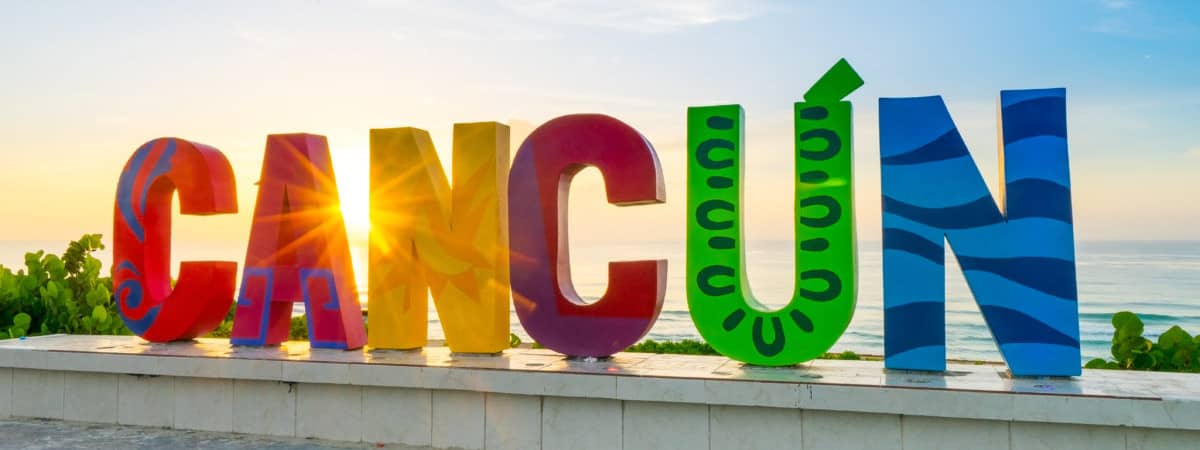
Cancun is one of the most popular tourist destinations in Mexico. To enjoy Cancun, travelers must have all the necessary documents to enter Mexico.
Passport holders from many countries can visit Mexico without applying for a visa . However, most visitors must complete the Forma Migratoria Múltiple (FMM), also known as the Mexican Tourist Card .
This article provides information about all the essential documents for visiting Cancun and how to process the Mexico FMM online.
What Do I Need to Travel to Cancun?
Foreign tourists must meet Mexico’s entry requirements to visit Cancun. Travelers need the following documents:
- Passport valid for at least 6 months from date of entry
- FMM Mexico Tourist Card (if arriving by land)
- Visa for Mexico (when applicable)
- Return flight ticket
- Documentation proving the purpose of the visit (such as hotel reservation)
- Proof of sufficient funds
Do I Need a Visa to Go to Cancun?
Not all tourists need a visa to visit Cancun. Citizens of the EU, the United States, and Canada can go to Cancun for up to 180 days visa-free .
To stay longer than 6 months, or for non-tourism purposes, a visa is required.
Similarly, travelers from non-exempt countries need to apply for a Mexico visa for their trip to Cancun. Among the countries that require a visa for Mexico are Cuba, India, the Dominican Republic, and Albania.
Mexico Tourist Card for Visiting Cancun
All foreigners visiting Cancun need to complete a Forma Migratoria Múltiple (FMM), also known as a Mexico Tourist Card if they are arriving via a land border.
The FMM requirement applies to every overseas visitor arriving by land , regardless of whether or not they need a visa.
The Mexico Tourist Card proves that the visitor’s stay in Cancun is legal and specifies the number of days the holder may spend in the country.
An FMM is required to visit Cancun for tourism , business, and a range of other travel purposes for up to 180 days.
The Mexico Tourist Card can be completed up to 30 days before the flight to Cancun.
How to Apply for a Mexico Tourist Card for Cancun
Visitors can complete the Mexico Tourist Card online before traveling to Cancun. The following documents are required:
- Passport valid for a minimum of 6 months
- Debit or credit card to pay the FMM fees
Travelers should fill out the FMM application form with the requested information, including:
- Personal information : name, date of birth, gender, country of citizenship
- Passport details : country, number, issue date, and expiry date
- Travel plans : date of arrival and departure, accommodation address
Applicants should check all the information carefully before submitting the request.
Traveling to Cancun with the Mexico Tourist Card
Passengers must print their tourist card before traveling to Cancun. They will be asked to present it on arrival at the Mexican border together with the passport and if required, a Mexican visa.
One part of the FMM card is kept by immigration officials and the other part is returned to the visitor. This part of the tourist card must be retained as it will be required on departure.
The completed FMM does not guarantee entry, the final decision lies with Mexico border officials.
How long can I stay in Cancun with the FMM?
The Mexican tourist card is valid for stays of up to 180 days in Cancun or elsewhere in the country.
It can only be used to enter Mexico once . Returning tourists need to complete a new FMM each time they travel to Cancun.
Is It Safe to Go to Cancun?
As a resort and major tourist city, Cancun is generally a safe destination . Crime rates are lower than in other Mexican cities.
Public transport and taxis are safe to use although holidaymakers should remain vigilant.
Regarding health, Cancun has implemented the World Travel & Tourism Council’s (WTTC) Safe Travels protocols and achieved the Safe Travels stamp.
Related News

Visitax Mexico: Tourism Tax for Quintana Roo
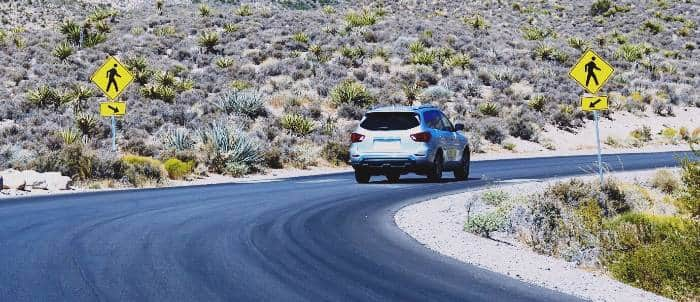
Crossing the U.S. – Mexico Border by Car
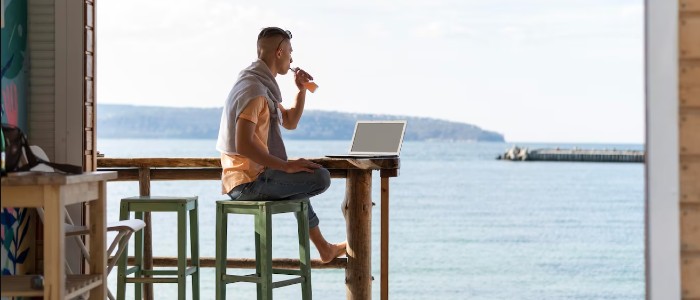
Digital Nomad Visa for Mexico: Everything You Need to Know

- Travel Guide /
- Cancun Travel Checklist
- Travel Guide
- Where to Go
- Cancun News
- Maps & Distances
- Travel checklist
- Public Services
- About hotels
Mexico entry requirements and Cancun travel checklist
As of 2010, every foreign national visiting Mexico is required a valid, currently unexpired passport to enter the country. In the past, U.S, citizens could enter with any official proof of citizenship document such as birth certificate or a green card, however this is no longer the case. Without a passport that is valid for at least 180 days after you arrival date, you will not be allowed into the country. You must have your passport with you from the moment you arrive at the airport in your home country. There are no exceptions for minors. When your arrive to Mexico you will be given a tourist card (form FM-T). You need to fill this short form that includes: name, number of days to be spent in Mexico, passport number, final destination of your trip, city of origin, dates of travel and means of arrival. Business travelers will also be given a FM-N 30 Days form, which will allow them to do business for a period of up to 30 days, but you cannot accept a job. Those who need to enter the country for reasons other than tourism and business, or to stay for more than 180 days, will need to apply for a visa at a Mexican consulate in their home country before coming to Mexico. It is important that you keep this form safe during your trip, as you will be required to turn it when leaving the country. If you lose or damage it you will be charged a $24 USD fee to replace it. When traveling with minors, Mexican law requires that any non-Mexican citizen under the age of 18 departing Mexico must carry notarized written permission from any parent or guardian not traveling with the child to or from Mexico. This permission must include the name of the parent, the name of the child, the name of anyone traveling with the child, and the notarized signature(s) of the absent parent(s) as well as the reasons for the trip. For the latest entry requirements go to: Mexico-entry-requirements
Mexico Visa Policy permits citizens of the countries listed below to travel to Mexico without a visa: Andorra, Anguila, Argentina, Aruba, Australia, Austria, Bahamas, Barbados, Belgium, Belize, Bermuda, Brazil, Bulgaria, Cayman Islands, Canada, Chile, Colombia, Commonwealth countries, Costa Rica, Croatia, Cyprus, Czech Republic, Denmark, Ecuador, Estonia, Faroe Islands, Finland, France, French Guyana, Gibraltar, Guadalupe, Germany, Greece, Greenland, Hong Kong, Hungary, Ireland, Iceland, Israel, Italy, Jamaica, Japan, Latvia, Liechtestein, Lithuania, Luxembourg, Macao, Malasia, Malta, Micronesia, Monaco, Netherlands, New Zealand, Norway, Perú, Poland, Portugal, Rumania, San Marino, Singapore, Slovakia, Slovenia, South Korea, Spain, Sweden, Switzerland, Trinidad, Turks and Caicos, United Arab Emirates, United Kingdom, Uruguay, USA, Venezuela.
What should you pack?
- Casual, comfortable clothes, like T-shirts and shorts
- Business casual attires for visiting some restaurants or night clubs
- Any important medications: bring enough for your whole trip
- Basic first aid kit: bandages, ointments, aspirins, and other over-the-counter medications you normally use in case you need them. Pack them in one kit and do not mix them with your other things. (You can buy medication in Mexico easily, but you cannot buy antibiotics without prescription)
- During the winter you may need a light sweater or sweatshirt for the occasional cool evening
- Raincoat or waterproof windbreaker in case of rain
- At least 2 swimsuits
- Walking shoes or sandals for the beach (the sand gets really hot, shoes are important)
- A camera: you may use your smartphone or you may want to bring a proper camera, water resistant or waterproof cameras are a plus
- Sunscreen: bring plenty of sunscreen, Cancun is a hot, tropical destination where the sun shine bright most of the year. It is very important for getting the most from your vacation to avoid getting sunburn. You will find that more and more places have banned non-biodegradable sunscreens in recent years to protect the environment. If you bring non-biodegradable sunscreen it may be taken from you at one point. We strongly recommend bringing biodegradable sunscreen to ensure you can use it everywhere you go.
- Insect or mosquito repellent: as with sunscreen, non-biodegradable insect repellents are banned in many places
- Dry-bags, ziplock bags, or other waterproof containers to protect your important belongings from water and sand while at the beach
- Snorkel equipment: If you plan on doing a lot of snorkeling, having your own gear would be a good investment
- A backpack comes very handy for tours and excursions
- Reusable water bottle
- Reusable straws: many places have stopping using plastic straws and they are soon to be banned in the state and not every place offers an alternative
We’re sorry, this site is currently experiencing technical difficulties. Please try again in a few moments. Exception: request blocked
- Skip to main content
- Skip to "About this site"
Language selection
Search travel.gc.ca.
Help us to improve our website. Take our survey !
COVID-19: Travel, testing and borders
Return or travel to canada.
For all travellers entering Canada by air, land or marine mode:
- Proof of COVID-19 vaccination is not required
- Pre-board testing is not required
- COVID-19 pre-entry and arrival tests are not required
- Quarantine after you enter Canada is not required
- to save time at the border, you can use Advance Declaration in ArriveCAN to submit your customs and immigration declaration before flying into Canada
- Pre-boarding tests for cruise passengers are not required
- As always, travel documents are required
- Health checks to board planes and trains are not required
- It's strongly recommended that you wear a well-constructed and well-fitted mask or respirator while you travel
If you have symptoms of COVID-19 , you shouldn't travel to Canada.
If you feel sick or experience any symptoms of COVID-19 during your travel to Canada or upon arrival, you should:
- inform the flight attendant, cruise staff or a border services officer upon arrival. You may be referred to a Quarantine Officer for a health assessment and further direction.
- avoid taking public transportation
- check provincial or territorial requirements for what you need to do if you’re symptomatic or have tested positive for COVID-19
Travelling in and out of Canada
- International travel advice and advisories
- COVID-19 and international travel
- Proof of vaccination
- Find out if you need a visa
Wearing masks on planes and trains in Canada is not required.
- It's still strongly recommended that you wear a high quality and well-fitted mask or respirator while you travel
Situation in Canada
- COVID-19 guidance, vaccines, limiting the spread
- Summary data about travellers, testing and compliance
The Government of Canada will continue to monitor the situation. See the COVID-19 border measures backgrounder .
- Skip to primary navigation
- Skip to main content
- Skip to primary sidebar
- Skip to footer
TravelAwaits
Our mission is to serve the 50+ traveler who's ready to cross a few items off their bucket list.
The Ultimate Guide of Things to Do in Cancun, Mexico

- Destinations
Welcome, amigos, to the ultimate guide on all things to do in Cancun! If visiting this awesome city is on your bucket list, then you’re in the right place. Cancun is so much more than just a typical beach vacation spot or a cruise port––it’s a whole experience waiting to be explored.
And trust me, this is one adventure you won’t want to miss out on.
Whether you’re seeking ultimate relaxation on the white sand beaches of Cancun’s all-inclusive resorts or channeling your inner Indiana Jones zip-lining through the jungle, this guide has got you covered. Whatever your travel style, there really is something for everyone in Cancun Mexico.
Drawing from personal experience, we’ll provide an insider’s look at the diverse range of activities awaiting you on your vacation to Cancun, Mexico. From snapping a selfie at the iconic colorful Cancun sign to exploring local culture in Mexico City’s ancient ruins, there’s something for every type of traveler.
So grab your sunscreen, pack your sense of adventure, and get ready to dive headfirst into the magic of Cancun Mexico. With our guide in hand, you’ll create memories that will last a lifetime. Trust us, this is one journey you won’t want to miss!
12 Things to Do in Cancun, Mexico
Of all the places to visit in Mexico , Cancun stands out as one of the most popular––and for a very good reason. When you visit Cancun, you might just assume it’s all about the spring break party life, live music, or maybe just the beaches. But believe it or not, there’s so much more!
We’ve collected a range of things to do in the vibrant atmosphere of Cancun to suit every type of traveler. Let’s get to it!
1. Explore Downtown Cancun

Whether you’re taking a cruise to Cancun or flying in, downtown Cancun is the spot to hit if you’re trying to get away from the beachfront resorts and explore the local culture. Stroll through bustling streets lined with colorful markets, lively street performers, and bustling crowds.
Don’t forget to try all the street food you can eat! Tacos, tamales, and empanadas–yum! Afterwards, wash it down with some Mexico City spirit by taking part in a tequila tasting. Not only can you sample a variety of tequilas, but you can also learn about the distillation process from experts.
You can even watch traditional music and dance performances, a great opportunity to hang out with the locals if you’re craving the opportunity to really dip your feet into Cancun’s heritage.
2. Go Scuba Diving
If you’re seeking the sea life, then Cancun is the place for you. There’s a whole underwater world right off the shore. The area’s warm waters make it an ideal spot for scuba divers seeking to explore the Mexican coast and the Caribbean ocean.
Off the coast of Cancun and extending along the eastern coast of the Yucatan Peninsula, you’ll find the Mesoamerican Barrier Reef. This spot is the second-largest coral reef system in the world, making it one of the best to spot tropical fish and sea turtles.
If you’re nervous about water sports, don’t worry. Guided dives can take you to underwater caves, coral gardens, and ancient shipwrecks. Whether you’re an experienced diver or slippin’ on those fins for the first time, this is the spot for you!
3. Visit Isla Mujeres

Isla Mujeres is a small island located just off the coast of Cancun, in the Caribbean Sea. You can take a ferry from Cancun in about 20 minutes. So what do you do there? A LOT!
Oh, the beaches!
Isla Mujeres is renowned for its powdery white sand beaches and crystal-clear turquoise waters. Playa Norte (North Beach) is super popular for its calm, shallow waters, making it an ideal spot for swimming and snorkeling. And on that note!
Snorkeling and Diving
The waters around Isla Mujeres are full of marine life and gorgeous coral reefs. This is one of the top spots for snorkeling and scuba diving, so if you’re ready to dive beneath the surface, add this spot to your list.
Golf Cart Rentals
However, if you’re the kind of traveler who would prefer to stay on land, don’t worry, Isla Mujeres is still for you. Explore Isla Mujeres by renting a golf cart and cruising around at your own pace. Definitely check out Punta Sur, where cliffs jut out over the Caribbean on the southernmost point of the island.
Isla Mujeres Turtle Farm
If you’re eager to see a cute little seat turtle up close and personal, then make sure you visit the Isla Mujeres turtle farm! Here you can learn about these fascinating creatures and how to help keep them safe!

Swim with Whale Sharks
Yep! You read that right! Swimming with whale sharks is a popular attraction here. The waters near Isla Mujeres are part of the Mesoamerican Barrier Reef System and every year from May to September, these gentle giants migrate to the warm waters to feed on plankton.
If swimming with whale sharks has always been on your bucket list, then this is the spot to do it. Just make sure you book your guided tour with a reputable tour company to ensure not only your safety, but the safety of the whale sharks!
4.Visit Puerto Morelos
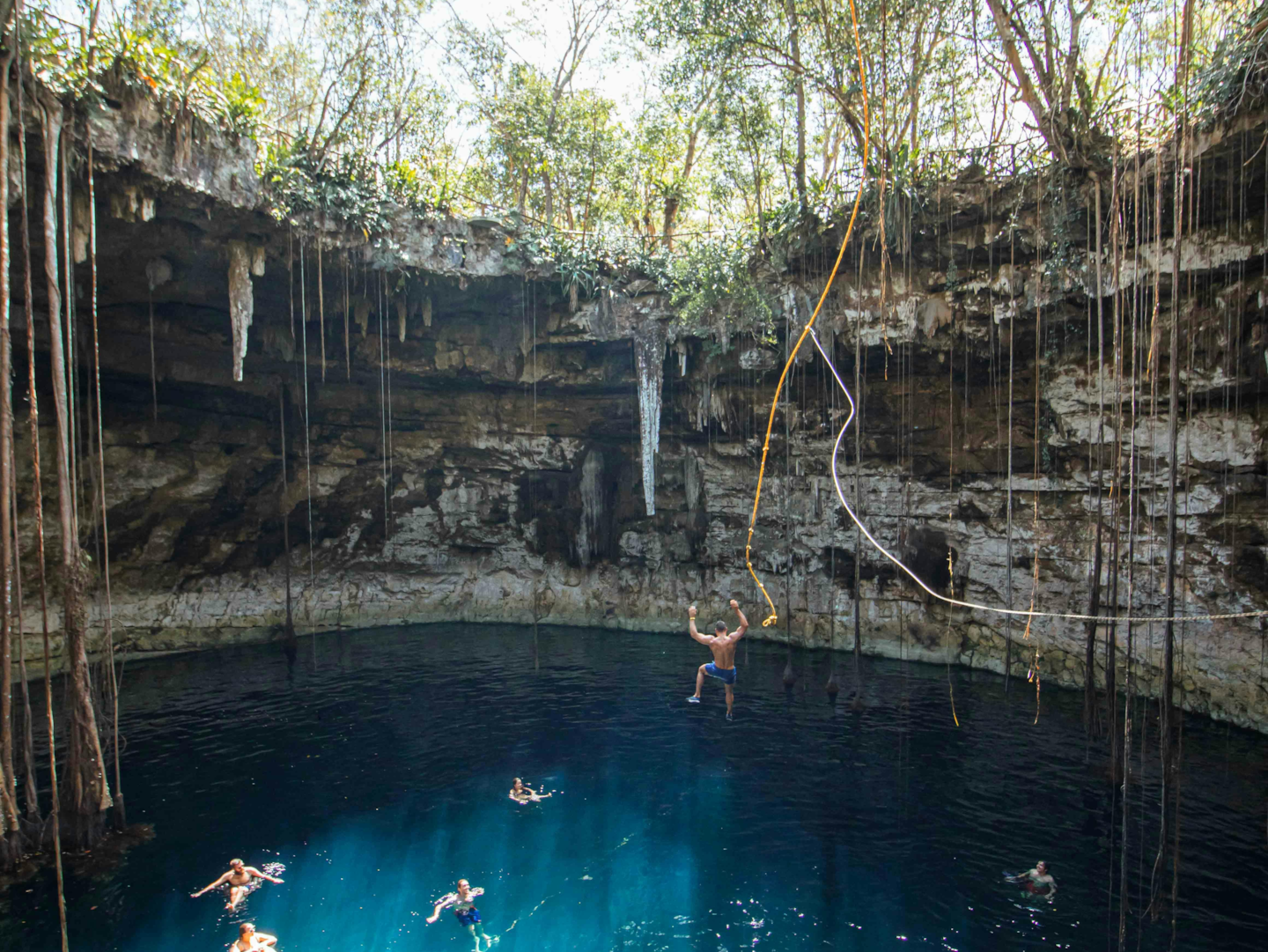
Take a day trip about twenty miles south of Cancun to Puerto Morelos, an awesome destination if you’re a nature lover or adventure seeker. The quaint little seaside town lines the Mesoamerican Barrier Reef, making it great for snorkeling or diving.
It’s also known for its cenotes, natural sinkholes filled with crystal-clear freshwater. You can even take a guided tour to swim in these unique geological formations. Puerto Morelos has a long history as a fishing village, making it great if you want to test out your skills.
5. Take a Trip to Cancun’s Hotel Zone
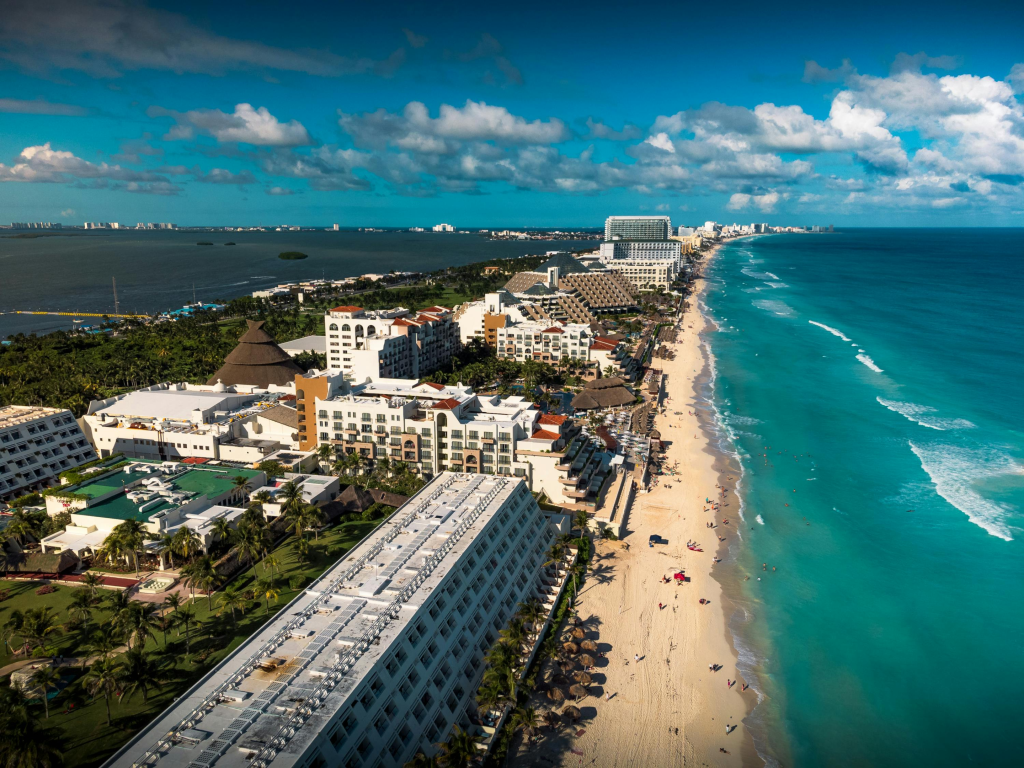
Cancun Hotel Zone is a long, narrow strip of land full of all-inclusive resorts . It’s one of the most popular tourist destinations in Mexico, known for its beautiful beaches and world-class resorts. You can also explore outdoor shopping malls, dine at waterfront restaurants, and party at nightclubs.
Here’s a list of just a few things you can do around the Cancun Hotel Zone.
Playa Delfines (Delfines Beach)
Playa Delfines is an exceptional spot for sunbathing, swimming, and water sports. Even better, it’s one of the few public beaches in the Hotel Zone, offering free access for visitors.
Cancun Interactive Aquarium
This family-friendly spot lets guests get up close with marine life. Feed stingrays, swim with dolphins, and even snorkel in the aquarium’s tanks. The aquarium offers an interactive approach to marine conservation.
La Isla Shopping Village
La Isla shopping village is a sprawling outdoor complex with a range of shops, restaurants, and entertainment spots. Stroll along the canals, shop for souvenirs, dine at waterfront restaurants, or even take a boat tour of the lagoon.
Cancun Wax Museum
Check out this unique museum and get close to lifelike wax figures of celebrities, historical figures, and pop culture icons. Take selfies with your favorite stars and learn about their contributions to art, culture, and history.
Coco Bongo is a world-famous nightclub and entertainment venue, making it the spot to be if you want to hear live music, DJ sets, or even acrobatic performances. It’s a lively atmosphere, making it the place to stop if you’re ready to dance the night away.
Maya Cancun Museum
Another awesome museum, make sure you swing by if you want to learn all about the rich history and culture of the Mayan civilization. See exhibits of artifacts, artworks, and archaeological findings and learn how the ancient Mayan civilization contributed to Mesoamerican culture.
Parasailing
A must for any beach vacation, try your hand at parasailing, a popular activity in Cancun’s Hotel Zone. Soar high above the turquoise waters and enjoy panoramic views of the coastline.
El Rey Ruins
The El Rey Ruins are a smaller archaeological site located within the Cancun Hotel Zone and offers visitors the opportunity to explore ancient Mayan ruins in a more accessible location than other ruins like Chichen Itza.
6. Explore Ancient Maya Ruins
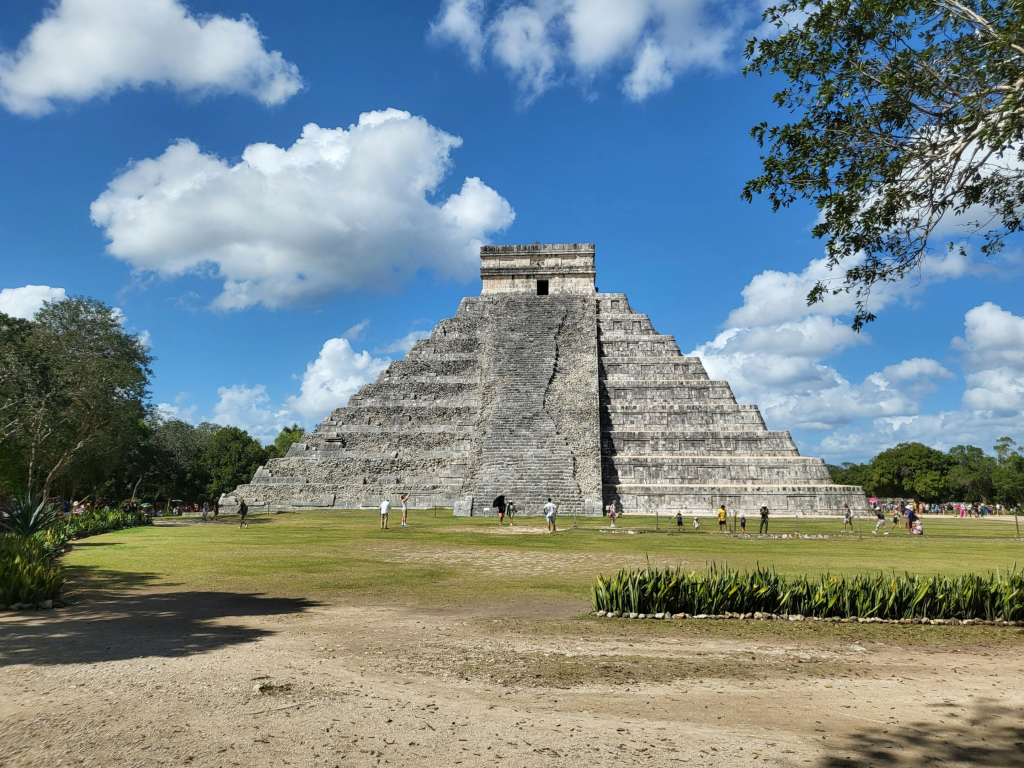
Who needs adventure parks when you have ancient Mayan ruins to explore? There are several nearby archaeological spots that are listed as a Unesco World Heritage Site. Among them is the ancient Mayan city of Chichen Itza, located several hours west of Cancun.
Chichen Itza is known for its well-preserved ruins and is close enough that you can make it a day trip to see all the sights. El Rey ruins is also a famous archaeological site, making it one of those Mayan ruins you won’t want to miss.
7. Visit the Underwater Museum
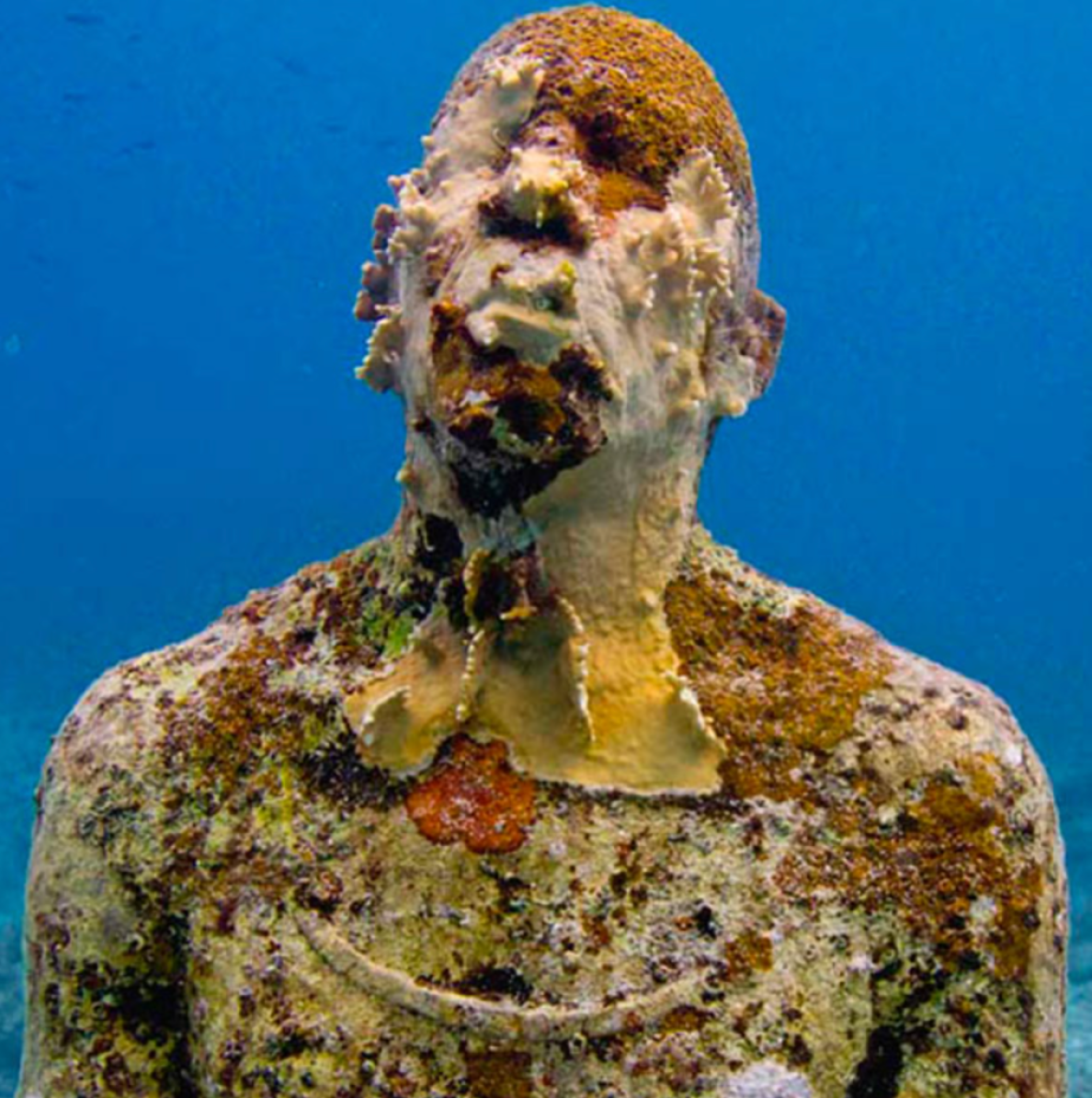
The underwater museum, known as the Museo Subacuático de Arte (MUSA), is located near Cancun, Mexico off the coast of Isla Mujeres and Punta Nizuc. It’s one of the world’s most unique attractions, featuring a collection of over 500 sculptures submerged in the crystal-clear waters.
You can visit the museum by snorkeling, diving, or even taking glass-bottom boat tours. The sculptures, made from specialized materials designed to promote coral growth, serve as artificial reefs and provide habitats for marine life.
8. Take a trip to the Riviera Maya

So what’s the difference between the Riviera Maya and Cancun? The Riviera Maya is a stunning stretch of coastline along the Yucatan Peninsula stretching from Cancun to the town of Tulum. The coastline is popular for swimming and diving, but is also home to many Mayan ruins like Chichen Itza.
If visiting an archaeological site is already crossed off your list, then check out the eco-parks for zip-lining, river tubing, and jungle treks. Visit traditional Mayan villages, attend cultural festivals, and eat some of that yummy Mexican food.
9. Make it a Beach Vacation
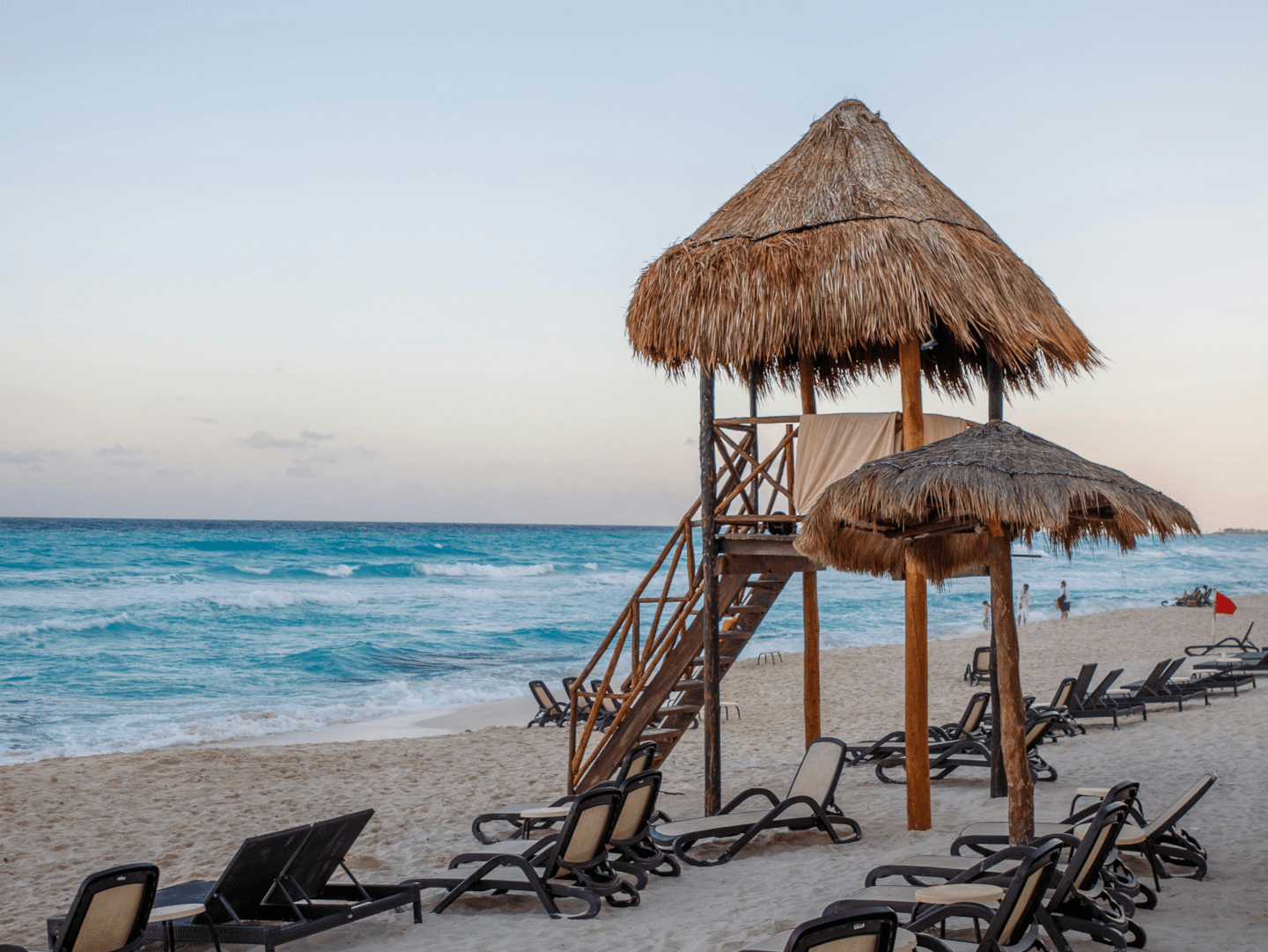
While most tourists are hitting Cancun for the beaches, it’s important to note that not all are the same. Playa del Carmen and Playa Norte are top choices if you’re seeking to relax along the Yucatan Peninsula in the Riviera Maya.
Playa del Carmen is an awesome public beach if you want to test your skills at water sports like snorkeling, kayaking, and paddle boarding.
On the northern tip of Isla Mujeres you’ll find Playa Norte, a picture-perfect public beach, ideal for a day trip by the sea. For those seeking a quieter and more secluded beach experience, check out Chac Mool in the Hotel Zone of Cancun.
10. Visit a National Park
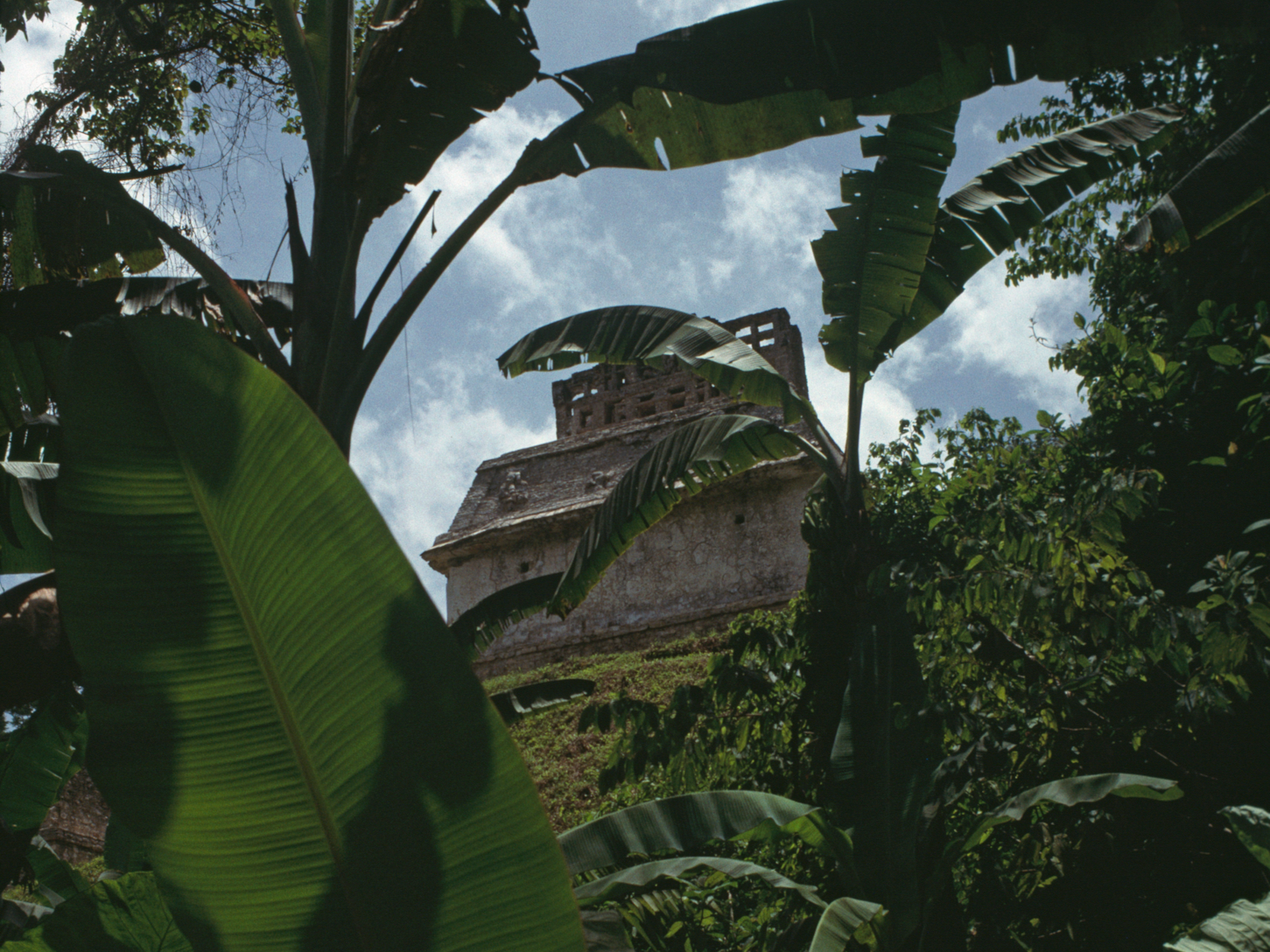
Who needs theme parks when you’re surrounded by so much nature? There are several remarkable natural reserves and protected areas in the surrounding area around Cancun that are definitely worth exploring:
Sian Ka’an Biosphere Reserve
Located south of Tulum, Sian Ka’an is a UNESCO World Heritage Site and one of the largest protected areas in Mexico. This vast biosphere reserve includes wetlands, mangroves, forests, and coral reefs. Take a guided boat tour through the wetlands and go bird-watching!
Isla Contoy National Park
Situated off the Caribbean waters of Cancun, Isla Contoy is a small uninhabited island that serves as a crucial nesting site for seabirds and marine turtles. This is one of the best spots if you want to observe wildlife in its natural environment.
Rio Secreto Natural Reserve
If you want to spend time in nature, then definitely check this spot out. Rio Secreto is a unique underground river system where you can explore subterranean cave networks on guided tours.
11. Take Part in a Temazcal Ceremony

If you’re hoping to spend time in Cancun learning about culture, then there’s no better experience than a Temazcal Ceremony. This traditional Mayan ritual dates back thousands of years and is better known as a sweat lodge ceremony.
The experience, conducted by a shaman, involves a spiritual cleansing and purification process where participants gather inside a small, dome-shaped structure made of stone or clay. The shaman leads you through a series of rituals, prayers, and chants, all with the goal of spiritual and physical healing.
The shaman pours water infused with medicinal herbs onto heated volcanic stones, creating steam, a sweat lodge, where you’re encouraged to reflect, meditate, and connect with yourself and the natural world by detoxifying your body.
12. Go to a Mexican Wrestling Event

Mexican wrestling, also known as Lucha Libre, is a type of professional wrestling that has deep cultural roots in Mexico. Lucha Libre features high-flying acrobatics, colorful masks, and theatrical performances that captivate audiences of all ages.
Of all the fun activities in Cancun, this is one of the more unique. These matches are popular in Mexican Caribbean culture and offer an entertaining glimpse into Mexican culture and tradition.
So there you have it! Proof that Cancun is so much more than a party town. From scuba diving with tropical fish and sea turtles in the natural beauty of the Caribbean sea to exploring Chichen Itza, there’s something for everyone.
Visit Cancun for a day trip or spend time to make this a fun experience you won’t soon forget.

Latest e-Edition
- The Brattleboro Reformer

- Print Edition
Brattleboro, VT (05301)
Partly cloudy skies early then becoming cloudy with periods of rain late. Thunder possible. Low around 50F. Winds light and variable. Chance of rain 100%..
Partly cloudy skies early then becoming cloudy with periods of rain late. Thunder possible. Low around 50F. Winds light and variable. Chance of rain 100%.
Updated: April 29, 2024 @ 8:46 pm
- Full Forecast
Brattleboro house fire claims pets' lives, causes smoke damage
Windham parents claim a legal victory in suit over education, saxtons river grey fox tested positive for rabies, groundworks collaborative announces intentions for morningside house.

Image Credit: Shutterstock.
In February, the United States Embassy & Consulates in Mexico issued a message for people traveling to Mexico for spring break. 'Travel Smart,' the message said before sharing advice on traveling safely through the country.
Is Cancún Safe To Visit in 2024?
- Ananyaa Bhowmik
- Apr 29, 2024
- Apr 29, 2024 Updated 18 hrs ago
In February, the United States Embassy & Consulates in Mexico issued a message for people traveling to Mexico for spring break. "Travel Smart," the message said before sharing advice on traveling safely through the country.
The U.S. Department of State also updated the travel warnings for Cancún and the rest of the state of Quintana Roo. While they removed warnings about the high risk of kidnappings, the state is still under a Level Two advisory.
Thousands of Americans, including many students, travel to Mexico every spring. Cancún and Tulum , especially, remain popular beach destinations throughout the year. Despite its popularity as an easily accessible travel destination, Cancún has often found itself under Level Two advisory, with the U.S. government repeatedly reminding citizens of the many dangers of visiting the thriving land with its populous beaches. Does that mean one ought to remove Cancun from the list of possible future travel destinations? Perhaps not.
The Current State
Like the rest of Mexico, Cancún has always valued its tourist industry. To ensure international travelers continue to frequent these lands, the nation introduced several security measures and ensured that tourist hotspots are always well-protected while visiting the city and the surrounding local areas.
According to a report featured in Riviera Maya News , Cancún recently deployed almost 2,400 officers to brace for the surge in tourist activities that happens every spring, ensuring the security of Quintana Roo's key areas.
Given the U.S. Embassy's warning, tourists may have reconsidered visiting the Mexican Caribbean this year. So, it should significantly benefit from the increased security around the zones that tourists tend to frequent.
According to the U.S. Department of State, its Level Two status means that while crime still exists, it's primarily non-violent. There is currently no warning not to travel to Cancún and the rest of Quintana Roo, so it still remains as safe as usual there. Tourists just need to be cautious to avoid pickpocketing and scams.
The local security forces frequently surveil the area known as the Hotel Zone: all the popular beaches, party zones, and famous resorts. Mexican officials are also focusing on providing land, air, and sea surveillance, covering everything from the hotel zones to beach fronts, bars, and even bus terminals, which are always well-guarded.
More from this section
Workers at 2 norwalk restaurants help save a man's life from raging fire, gm john schneider, coach mike macdonald on seahawks' 3rd-rd nfl draft pick christian haynes, sheriff: windows shattered in hopewell junction bus crash, no major injuries, staying safe while traveling.
Security isn't much of an issue, especially when it comes to Cancún and other beloved tourist destinations in Mexico. In fact, the 2023 Expat Insider survey by InterNations revealed that Mexico is the most popular nation for expats to settle in. The nation ranked first out of 53 destinations in the survey and has been in the top five since InterNations first conducted the study in 2014.
Expats in the country found it easy to settle in and enjoy the affordability and access to a thriving social life. In fact, 90% of expats like living in Mexico and are happy there. That said, it is better to be safe than sorry.
To ensure one's journey to Cancún and other tourist hotspots is delightful instead of dangerous, the U.S. Embassy recommends enrolling in the State Department's Smart Traveler Enrollment Program to receive updates on safety conditions in Mexico. Enrolling in the program will also allow the embassy to easily contact one in case of emergencies.
General street smarts, including being careful while walking around at night, especially outside the Hotel Zone, carrying limited cash , and obeying local laws, are important to keep in mind while visiting as well.
Here are a few other important tips to consider before jetting off on your next Mexico vacation:
- Stay up to date on travel advisories, country information, and entry requirements
- Having the necessary health and travel insurance with appropriate coverage
- Don't swim while drunk or in unsafe areas. There are strong undercurrents and riptides on some beaches, and there may not always be a lifeguard or appropriate signage in the area, so one must exercise increased caution
- Drink responsibly and make sure to do it in groups
- Being careful while using public transportation, especially when alone
- Keeping passports and entry permits in a safe but accessible place
Overall, it's important to exercise awareness of your surroundings, avoid unsafe locations, and leave as soon as potentially dangerous situations occur.
Originally published on mediadecision.com , part of the BLOX Digital Content Exchange .
- Quintana Roo
- Transportation
- Hydrography
- Hospitality Facilities
- Media And Communication
- Government Departments And Ministries
Local Business News
Casella's construction plans move forward.
- Apr 22, 2024
BRATTLEBORO — Casella Waste Management received local approval to demolish a transfer and storage building then construct a new transfer facil…
'A global destination': Vermont's tourism celebrated by Legislature
MONTPELIER — Pointing at several pieces of data, lawmakers applauded what they called the "strong and positive impact of tourism on Vermont’s …
Infrared heat yoga studio finds new home at Heart Rose Club
- Apr 8, 2024
BRATTLEBORO — After a hiatus, Kristin Cassidy has brought her infrared heat yoga classes back to the community.
As a Nordic adventure ends, another begins
- Mar 18, 2024
Through their nearly 50 years of stewardship at Viking Nordic Center, Dana and Malcolm McNair have become more iconic than Viking's eponymous …
Elliott Greenblott | Fraud Watch: Beware the eclipse scammers
April 8 provides northern New England with a rare treat as the “path of totality” for a solar eclipse that will pass over the region. Eclipses…
- More Business News
Vermontitude
Vermontitude episode 66: make a wish vermont, with guest barbara harris.
- Watch more Vermontitude podcasts
Online Features
7 reasons renting an rv should be on every family’s summer bucket list, celltrion usa signs agreement with express scripts for its therapy for autoimmune diseases including the first fda-approved subcutaneous infliximab zymfentra™.
- By Celltrion USA
- Apr 28, 2024
CYTALUX Real-World Experience Presented at the American Association for Thoracic Surgery 104th Annual Meeting
- By On Target Laboratories, Inc.
- Notifications
Get up-to-the-minute news sent straight to your device.
- Toll free USA/CAN +1 800 931 4614

Travel to Cancun from the United States: A Guide
- January 20, 2022
Table of Contents
Are you dreaming of palm trees, warm breezes, and swimming in the turquoise Caribbean waters of Cancun? Maybe you’re wondering if you can travel to Cancun from the US right now. The good news is that Mexico is open for tourism and Cancun is welcoming visitors from all over the world.
Tourism is alive and well in Cancun with only limited restrictions for travel. Have a look at our tips for traveling to make your journey and holiday stress-free. So, grab your suitcase and swimsuit. Cancun is waiting for you!
What Do I Need to Travel to Cancun?
Air travel from the united states to cancun.
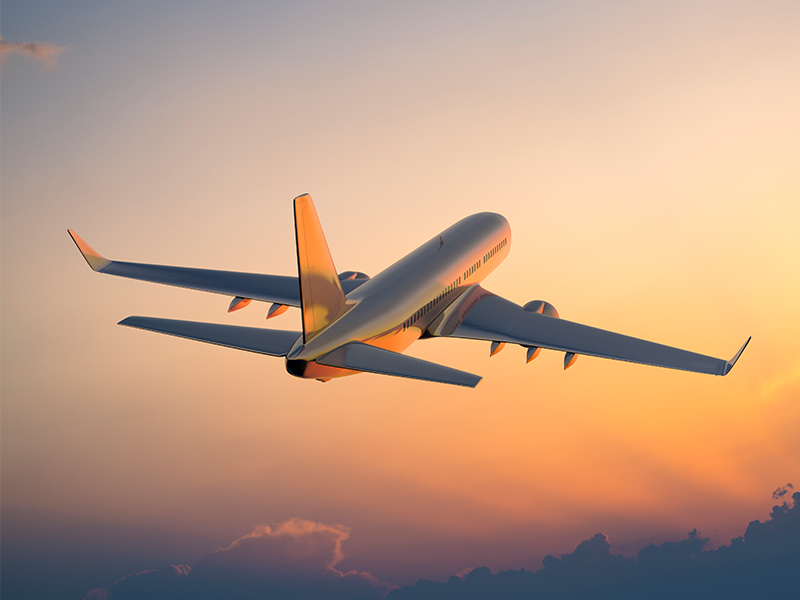
Traveling by air to Cancun is by far the easiest means of travel to Cancun. Currently, there are numerous direct flights to Cancun leaving from major international airports throughout the United States including: American Airlines, Frontier Airlines, JetBlue, Southwest Airlines, and Spirit Airlines all have a strong network of non-stop flights from the United States.
Travel Requirements to Mexico
Tourist card for mexico.
US Citizens are eligible to travel to Cancun visa-free. However, when entering Mexico via air or a land border, you must present a Tourist Card upon entry AND exit.
The Tourist Card , Forma Migratoria Múltiple (FMM), is an Entry Immigration Form that details information about foreign tourists visiting Mexico. Tourist cards are valid for up to 180 days and allow the holder to remain in Mexico as a tourist for the allotted time. Be sure to hold on to your tourist card and keep it in a safe place as you will need to hand it in when you are departing the country.

While on the airplane, your flight attendant will hand you the form to be filled out before you land and shown at customs when entering Mexico. The tourist card must be stamped by an immigration official, otherwise it is not valid. If you happen to lose your card while on vacation, don’t panic, you can get a replacement card at the airport on the day of your departure. Just make sure you plan to arrive in plenty of time and be prepared to pay the replacement fee.
Something to note is that recently, Mexican immigration officials have been giving tourists specific amounts of time that they are allowed to stay in Mexico, instead of the blanket 180 days that they used to give everyone. Immigration officials at the border may ask to see your return ticket and stamp your tourist card and your passport with the specific number of days that you will be in Mexico. So be prepared to show your return ticket when you arrive in Mexico.
COVID Travel Requirements for Entering Mexico
Mexico has made it very easy for tourists to come to Mexico with very few travel requirements. Air travel is allowed into Mexico and being fully vaccinated is not a requirement. Up until recently, visitors and residents entering the country had to complete a health declaration form online and scan the QR code prior to boarding their outbound flights and again upon arrival in Mexico. However, on January 1, 2022, Mexico officially discontinued this form. Now the requirements to enter Mexico are the same as they were pre-COVID. There is no need to take a COVID test before departing from the US or undertake any form of quarantine upon arrival in Mexico.
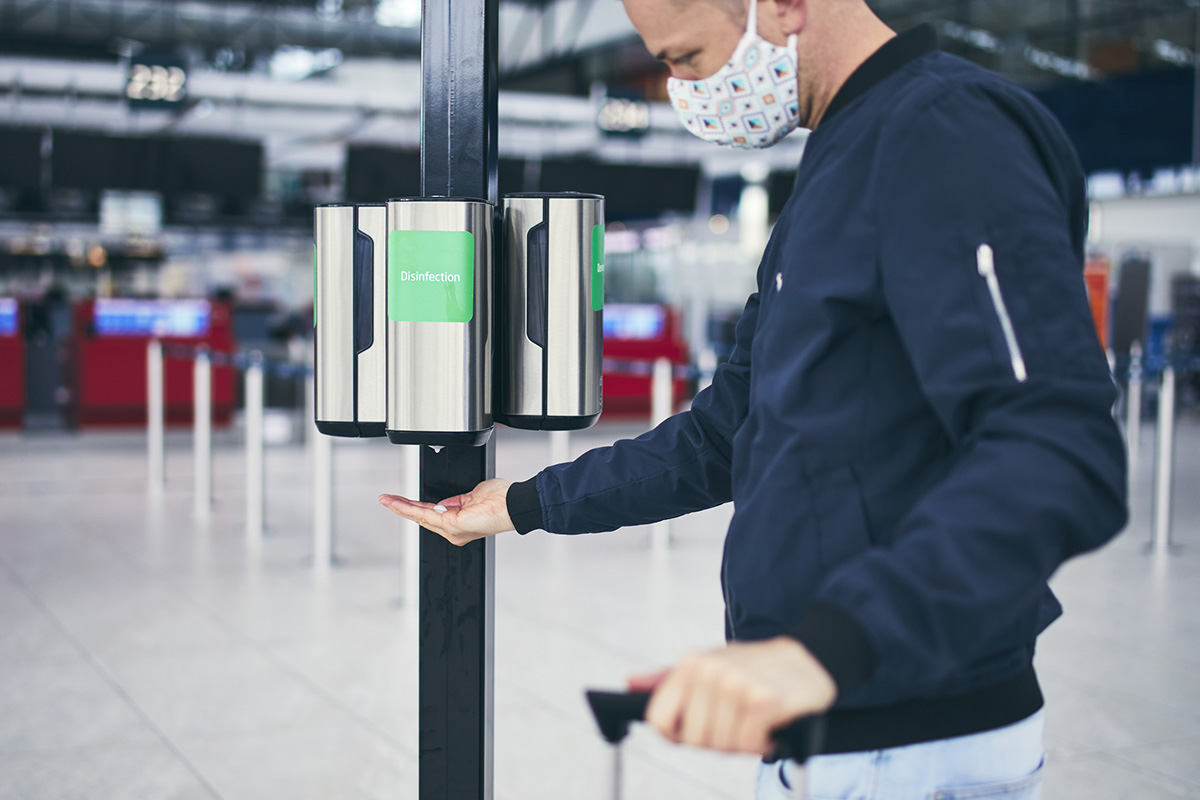
Getting into Mexico is relatively easy, but getting back to the US does require proof of a negative viral COVID test result (PCR/NAAT or antigen test for current infection) for all travelers age 2 and up, taken within 24 hours of arrival to the US regardless of vaccination status. Antibody tests are not compliant with the requirement.
If you’ve already tested positive for the virus within the last three months, you will need to show documentation of recovery. According to the Centers for Disease Control and Prevention (CDC), the combination of a recent positive viral test and a letter from your healthcare provider stating you are cleared for travel constitute documentation of recovery.
Travelers to Canada must provide proof of a molecular COVID-19 test taken within 72 hours of arriving in Canada. They must also enter their travel information, proof of vaccine, and quarantine plan (in the event of testing positive) in the ArriveCAN app prior to departure.
Currently, Mexico has had about 4,495,310 cases of COVID-19 and has administered at least 157 million doses of the vaccine .
As of January 10, 2022, 19 out of 32 Mexican states are listed as green in the national “stoplight” system. Green means that the risk of contagion is low, economic activity has resumed to near normal levels, and mask wearing is still recommended, but not necessarily mandatory, depending on the location.
Visitors are likely to find situations differ depending on where in the country they travel, with local restrictions varying. Stay up-to-date by checking the traffic light status chart , which is updated every two weeks.

Essential Travel Tips for Your Trip to Cancun
What to do before you travel to cancun.
There are a few key things you’ll want to check off your list before heading to paradise that don’t involve packing to make sure your journey goes smoothly.
- Pay the new mandatory tourist tax called “ Visitax ” online
- Fill out your Tourist Card on the plane or online
- Make sure your mobile is unlocked if you want to get a Mexican SIM card or sign up for an international plan with your home mobile carrier
- Bring at least 2 credit or debit cards so you have a backup should any complications arise
Mobile Tips
It’s always nice to have use of your mobile for calling Ubers, getting directions, or making reservations. Many American carriers such as T-Mobile even include Mexico in their plans, meaning you won’t need to change your SIM card.
If you do decide to get a Mexican SIM, the biggest mobile provider is Telcel and it’s super easy to get set up with them for data packages as long as your phone is unlocked.
If you just need sporadic Wi-Fi use, most hotels and cafes do offer free Wi-Fi.
Mexico Travel Apps
Putting the right stuff on your phone is almost as important as putting the right stuff in your suitcase. A few travel apps that are helpful in Mexico include: Uber, Google translate, WhatsApp, and XE Currency.
What to Bring to Cancun?

We all dream of living in our shorts, swimsuit, and flip-flops and Cancun has the perfect climate for warm weather outfits. Depending on what time of year you travel to Mexico, you’ll want to be prepared for a night out on the town, surprise rain showers, scorching sun, and sightseeing excursions into the lush jungles of the Riviera Maya during your holiday to Cancun.
Here’s Your Cancun Packing List:
- Warm weather clothes (casual beach wear and dress for nights of fine dining or clubbing)
- Sweater or light jacket for cool tropical evenings
- Lightweight rain jacket and umbrella for the rainy season
- Sandals and flip-flops
- Sneakers for jungle adventures
- Bathing suits (bring a few to rotate)
- Bug spray and sunscreen
- Medications (don’t’ forget to bring non-drowsy Dramamine if you want to go on a boat trip)
- Sarong or quick-dry towel for water activities
- Extra change purse so you can carry cash in a few different spots
- A daypack or large tote bag to pack all your goodies for day trips and sightseeing
- Charging plugs and cables for your devices. You don’t need to bring adaptors because Mexico uses the same outlets as the US.
How to Stay Safe and Healthy in Cancun
It’s never a bad idea to be extra vigilant when you’re in a new country, but you don’t want fear to ruin your holiday. It’s all about being smart and aware. By following some simple tips, you can keep safe and stay healthy when you travel to Cancun.
Cancun is a world-famous destination for international tourists who come to enjoy the natural beauty, culture, and affordable holiday activities and accommodations. Restaurants and hotels in touristy areas are set up to cater to western traveler’s needs, reducing the need to be overly cautious about everything you eat and drink. The cuisine in the Yucatan is unique and delicious, eat until your heart’s content. But, do stick with bottled water to save yourself from missing out on your days in paradise.
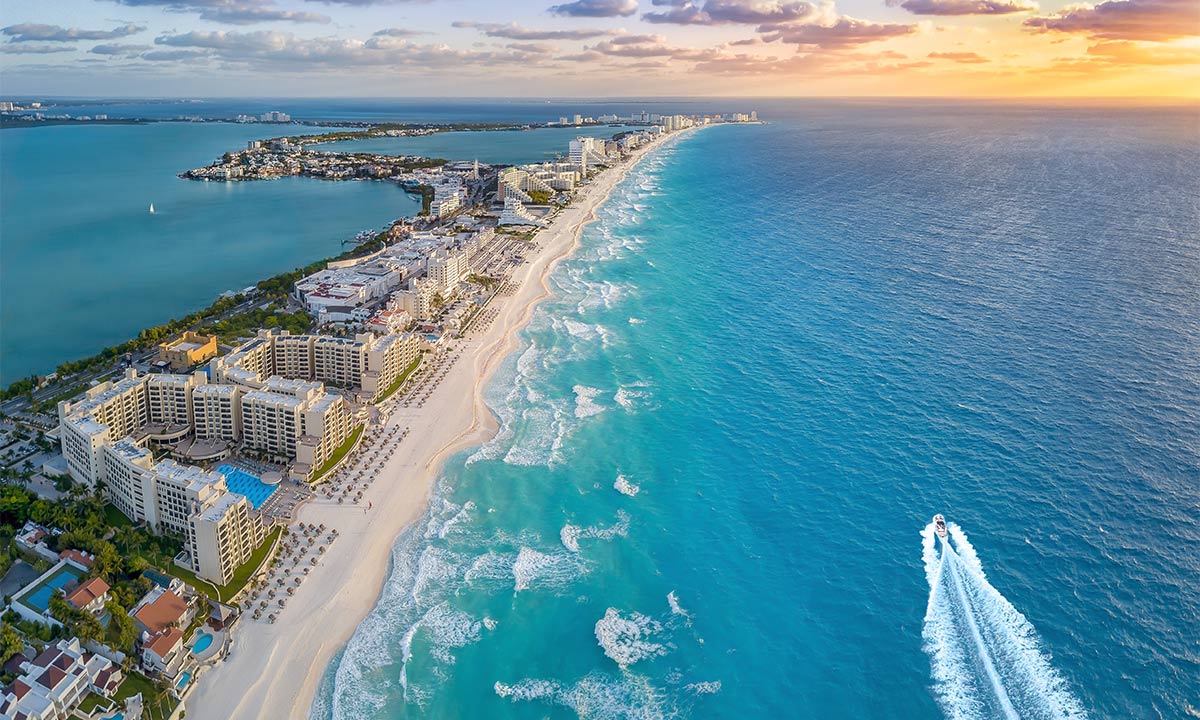
While Cancun is a safe city, there is crime. Don’t make yourself a target by wearing expensive jewelry, being careless with your mobile, or flashing lots of cash when paying for items. Keep your cash in separate places (wallet and purse pocket) with smaller currency in your wallet.
Whether you are a solo traveler, couple or group, avoid walking on dark and empty streets at night. Stick to crowded and well-lit streets.
Wear your face mask in crowded areas, bring hand sanitizer and remember to apply it often, also practice social distancing and avoid getting too close to others who are not traveling with you.
Choose a resort that has a reputation for its health and safety standards, like Garza Blanca Cancun .
Understanding Money in Mexico
Mexico uses the peso (MXN). The average 2022 exchange rate is 20 pesos to the dollar. Download the XE Currency app for daily currency rates and exchanges.
How To Get Money
ATMs : It’s not hard to find an ATM in Mexico, especially in popular tourist areas. Generally speaking, the transaction fees on the Mexican side are quite low ($1-2 per transaction). You’re better off withdrawing your maximum daily limit to avoid multiple transaction fees for small withdrawals.
Cash Exchanges : There are plenty of cash exchanges in popular tourist zones, but you never get a very good rate from them.
Credit Cards : Mexico is still very much a cash-based society, but it’s becoming easier to use a credit card. You’ll have no problem using your card to pay for your hotel, rent a car, shop at larger shopping centers, pay entrance fees at major attractions, and at nicer restaurants and bars.
We hope that you have found our travel to Cancun guide useful and that it will come in handy when you decide to live the vacation of a lifetime in a beautiful tropical paradise. Happy travels!
Related posts

Unveiling Boat Rentals Near Garza Blanca Cancun
From the moment you step on board, you’ll be greeted with the warm hospitality of an experienced crew member to ensure your cruise is nothing short of incredible.

Premium Wines and Spirits at Garza Blanca Los Cabos
At Garza Blanca Los Cabos, you can enjoy a perfectly curated choice of top-class wines and spirits, from the sun-soaked

Yoga and Meditation Retreats at Garza Blanca Resorts
Garza Blanca Resorts are more than just luxurious accommodations; they are havens dedicated to intensely enriching your mind, body, and soul.

Unveiling the Tech Luxuries at Garza Blanca Cancun
At Garza Blanca Cancun, the fusion of modern tech and opulent comfort is evident from the very moment you step into the sanctuary that is your suite.
Book Your Next Beach Getaway at Garza Blanca Resorts Now!
Latest news.

10 Must-Try Seafood Dishes at Garza Blanca Cancun

How to Plan a Garza Blanca Cabo Wedding
Celebrities.
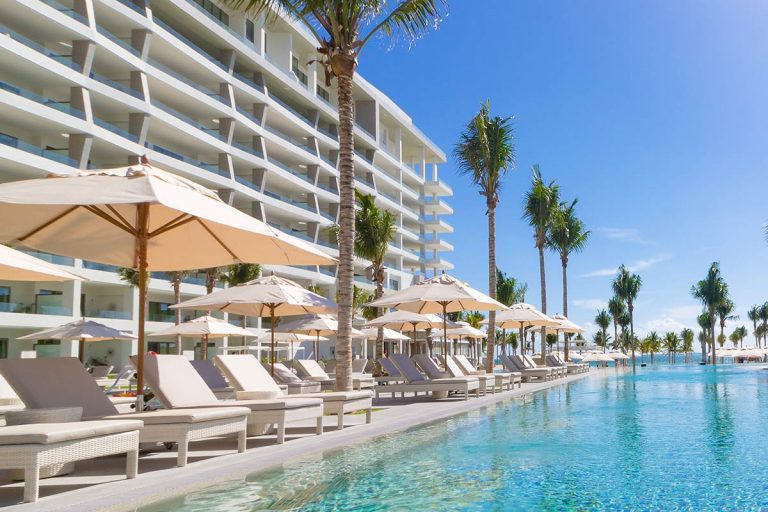
Where do Olympic Champions Vacation in Mexico?

Garza Blanca Cancun Hosts the Hottest Celebrities of the Moment

Which Celebrities Vacation in Los Cabos?
#GarzaBlancaResorts
Garza Blanca Resorts & Spa
- Puerto Vallarta
- Riviera Maya
Awards and recognitions
Hotels & resorts.
Copyright © 2024 — All rights reserved

Booking Form

Language selection
- Français fr
I am an American citizen. What do I need to enter Canada?
American citizens, including American-Canadian citizens, must carry proper identification and meet the basic requirements to enter Canada . You do not need a Canadian passport, a Canadian visa or an eTA to enter Canada if you are travelling with a valid U.S. passport.
New entry requirement now in effect
Visa-exempt foreign nationals need an Electronic Travel Authorization (eTA) to fly to or transit through Canada by air. Exceptions include U.S. citizens and travellers with a valid Canadian visa. Canadian citizens, including dual citizens , and Canadian permanent residents cannot apply for an eTA.
Did you find what you were looking for?
If not, tell us why:
You will not receive a reply. Telephone numbers and email addresses will be removed. Maximum 300 characters
Thank you for your feedback
Answers others found useful
- Do I need a visa to visit Canada?
- Do I need a Canadian visa if I have a United States visa?
- How do I apply for an eTA for travel to Canada?
- I am visiting the U.S. I want to come to Canada. Do I need an eTA?
- Do I need a visa if I am travelling through Canada without stopping or visiting?
- How do I help a family member or friend apply to visit Canada?
- I am travelling with my minor child without my spouse. What documents must I present?
- What’s the difference between a visitor visa and a visitor record?
- Do I need to apply for both a visitor visa and an eTA?

How to videos
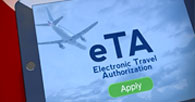
Glossary term
- Admissibility
Language selection
- Français fr
The CBSA reminds private boaters of reporting requirements
From: Canada Border Services Agency
News release
April 23, 2024 - Ottawa
With boating season fast approaching, the Canada Border Services Agency (CBSA) reminds all private boaters of their entry and reporting obligations when navigating Canadian waters or entering Canada by boat. Understanding the reporting requirements will ensure a safe and enjoyable season on the water.
These are the top travel tips for boaters entering Canada:
- Know before you go. Before lifting anchor, be sure to review the CBSA’s Reporting requirements for private boaters . Requirements vary depending on your itinerary, your nationality and number of passengers onboard.
- If you are a foreign national, you must be admissible under the Immigration and Refugee Protection Act .
- All passengers onboard, regardless of their nationality, should have acceptable identification.
- did not land outside Canada and did not anchor, moor or make contact with another conveyance while outside of Canadian waters
- did not embark or disembark any people or goods while outside Canada
- call the CBSA’s Telephone Reporting Centre to request clearance toll free at 1-888-226-7277
- or speak directly with a CBSA officer
- Exceptionally, private vessels carrying 30 or more passengers must seek clearance at designated marine reporting site at least 72 hours before you arrive in Canadian waters in writing
- Failure to report to the CBSA , even if it is to refuel, may result in detention, seizure or forfeiture of the boat and/or monetary penalties. The minimum fine for failing to report to the CBSA upon entry to Canada is $1,000.
- Know what’s onboard. Restricted and prohibited goods include, but are not limited to, firearms and ammunition and weapons; food, plants, animals and related products; explosives and fireworks. Think before you load up your boat as you must report these goods to the CBSA and obtain the necessary permits (if required), even if they meet the conditions for a reporting exception.
- Cannabis: Don’t bring it in. Don’t take it out. Bringing cannabis across the border in any form, including oils containing tetrahydrocannabinol (THC) or cannabidiol (CBD), without a permit or exemption authorized by Health Canada is a serious criminal offence, despite the legalization of cannabis in Canada. A medical prescription from a doctor does not count as Health Canada authorization.
- NEXUS members can call the NEXUS Telephone Reporting Centre at 1-866-99-NEXUS. For more information on NEXUS reporting procedures, visit NEXUS: Trusted traveller program for travel by air, land and boat .
Associated links
- Reporting requirements for private boaters
- Marine Telephone Reporting Sites across Canada
- How to use NEXUS to enter Canada by boat
- I Declare: A Guide for residents returning to Canada
For more information about CBSA programs, services and initiatives, please visit the CBSA website or contact:
Border Information Services Canada Border Services Agency 1-800-461-9999 Contact us online Live agents are available Monday to Friday from 8 am to 4 pm local time
Telephone Reporting Centre (TRC) 1-888-226-7277
For more information or to schedule a media interview with a CBSA representative, please contact:
Media Relations Canada Border Services Agency [email protected]
Website: www.cbsa-asfc.gc.ca Twitter: @CanBorder Facebook: CanBorder Instagram: CanBorder YouTube: CanBorder
Page details

IMAGES
VIDEO
COMMENTS
Verify this information with the Foreign Representatives in Canada. Passport. Entry requirements vary depending on the type of passport you use for travel. Before you travel, check with your transportation company about passport requirements. Its rules on passport validity may be more stringent than the country's entry rules. Regular Canadian ...
Entry Requirements to Mexico From Canada. Even though Canadian passport holders may travel to Mexico legally without a visa, they will still have to carry a valid passport issued by the Canadian government to identify themselves.. The Canadian passport must also be valid for at least six months (180 days) after the proposed arrival date in Mexico.. One of the key Mexican entry requirements is ...
Due to the recent travel restrictions in different countries, Cancun International Airport makes available Covid-19 tests for all the passengers that need them. Mobile Units. There are available modules at terminals 2,3 and 4 to get tested. These mobile units are operating from 6:00 am to 9:00 pm. Antigen tests 17 USD, $290 MXN (30 minutes results)
Coming to Cancun? Remember to check any new travel regulations that might have been issued by the US or Mexican Government. Check out the Cancun Airport Regulations. ... please call TOLL FREE from the US and Canada at 1-888-414-0017 or direct at +52 998 848 0333.
Call us in Washington, D.C. at 1-888-407-4747 (toll-free in the United States and Canada) or 1-202-501-4444 (from all other countries) from 8:00 a.m. to 8:00 p.m., Eastern Standard Time, Monday through Friday (except U.S. federal holidays). See the State Department's travel website for the Worldwide Caution and Travel Advisories.
Mexican authorities do not require a minimum period of validity of passports; nevertheless, this document must be valid at the time of entry and during the period you wish to be in Mexico. Permanent residents of Canada must present their Permanent Resident Card and one of the following documents: valid Passport or Refugee Travel Document.
Cancun remains one of the most attractive international travel destinations in 2021. The Mexican Caribbean hotspot reopened with enhanced health and safety protocols in place last year and seen a tourism boom of late as hotels and resorts reopen and airlines increase flights. Visiting Cancun in the era of COVID-19 will require travelers to take some additional precautions but the resort city ...
The basics. Mexico is open to travelers. You do not need to provide a negative result of a Covid-19 test or proof of vaccination to enter. You might be subject to a health screening before ...
If you test positive while in Mexico, you may have trouble getting home. Since January, Americans have been required to present a negative COVID-19 test in order to board a flight back to the U.S ...
Use Advance Declaration in ArriveCAN to submit your customs and immigration declaration before flying into Canada. Government of Canada's official one-stop-shop for comprehensive international travel information.
A Covid test is not required to enter Mexico, proof of vaccination is not required, and there's no mandatory quarantine after arrival. The airline might say a health questionnaire is required, but it isn't being collected upon arrival at airports at Cancun, Puerto Vallarta, Mexico City and Cozumel. The questionnaire is required for departure ...
Make sure to check in with government of Canada advisories before planning a trip anywhere in Mexico to keep up-to-date on which areas are currently affected. TravelAlerts will continue to keep an eye on the situation and any new developments to the regional advisories, and we will continue to bring you the best all inclusive packages to resort ...
1.-. Valid passport (throughout your stay and departure) and valid in accordance with international law. DNI is NOT acceptable as a travel document to Mexico. 2.-. FMM duly filled out. (Tourist Card) 3.-. The immigration authority may request the foreign person to verify the reason for their trip, by means of any of the following documents:
Mexico entry requirements stipulate that you will need the following 3 documents in order to enter Mexico: 1. Valid Passport. 2. FMT (Tourist, Business), FM2 or FM3 Form. 3. Custom's declaration form. The government of Mexico requires current proof of citizenship, a photo ID, and a valid passport for entry into Mexico.
The Mexico Tourist Card proves that the visitor's stay in Cancun is legal and specifies the number of days the holder may spend in the country. An FMM is required to visit Cancun for tourism, business, and a range of other travel purposes for up to 180 days. The Mexico Tourist Card can be completed up to 30 days before the flight to Cancun.
Checklist for entry requirements for Cancun Mexico, travel advise, what to pack and bring for your vacation From Mexico: 800-225-8383 USA & Canada: 1-866-387-6678 International: +52 (998) 849-4923 Whatsapp: +52-998-321-1173
There are no travel restrictions for U.S. government employees in Quintana Roo state. However, U.S. government employees are advised to exercise increased caution after dark in downtown areas of Cancun, Tulum, and Playa del Carmen, and to remain in well-lit pedestrian streets and tourist zones.
Proof of COVID-19 vaccination is not required. Pre-board testing is not required. COVID-19 pre-entry and arrival tests are not required. Quarantine after you enter Canada is not required. Using ArriveCAN is not required, but. to save time at the border, you can use Advance Declaration in ArriveCAN to submit your customs and immigration ...
5. Take a Trip to Cancun's Hotel Zone Cancun Hotel Zone. Cancun Hotel Zone is a long, narrow strip of land full of all-inclusive resorts. It's one of the most popular tourist destinations in Mexico, known for its beautiful beaches and world-class resorts.
Discover the latest requirements and restrictions for traveling to Mexico from the U.S., including COVID-19 testing, insurance and quarantine. Forbes Advisor has all the details you need.
In February, the United States Embassy & Consulates in Mexico issued a message for people traveling to Mexico for spring break. "Travel Smart," the message said before sharing advice on traveling safely through the country. The U.S. Department of State also updated the travel warnings for Cancún and the rest of the state of Quintana Roo. While they removed warnings about the high risk of ...
Maybe you're wondering if you can travel to Cancun from the US right now. The good news is that Mexico is open for tourism and Cancun is welcoming visitors from all over the world. Tourism is alive and well in Cancun with only limited restrictions for travel. Have a look at our tips for traveling to make your journey and holiday stress-free.
If you are an American citizen who wants to enter Canada, you need to know the requirements and procedures for crossing the border. This webpage provides you with the information on what documents you need, how to apply for an eTA or a visa, and what to expect upon arrival. You can also find links to other useful resources on health, taxes, and benefits in Canada.
Understanding the reporting requirements will ensure a safe and enjoyable season on the water. These are the top travel tips for boaters entering Canada: Know before you go. Before lifting anchor, be sure to review the CBSA's Reporting requirements for private boaters. Requirements vary depending on your itinerary, your nationality and number ...